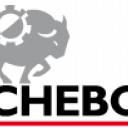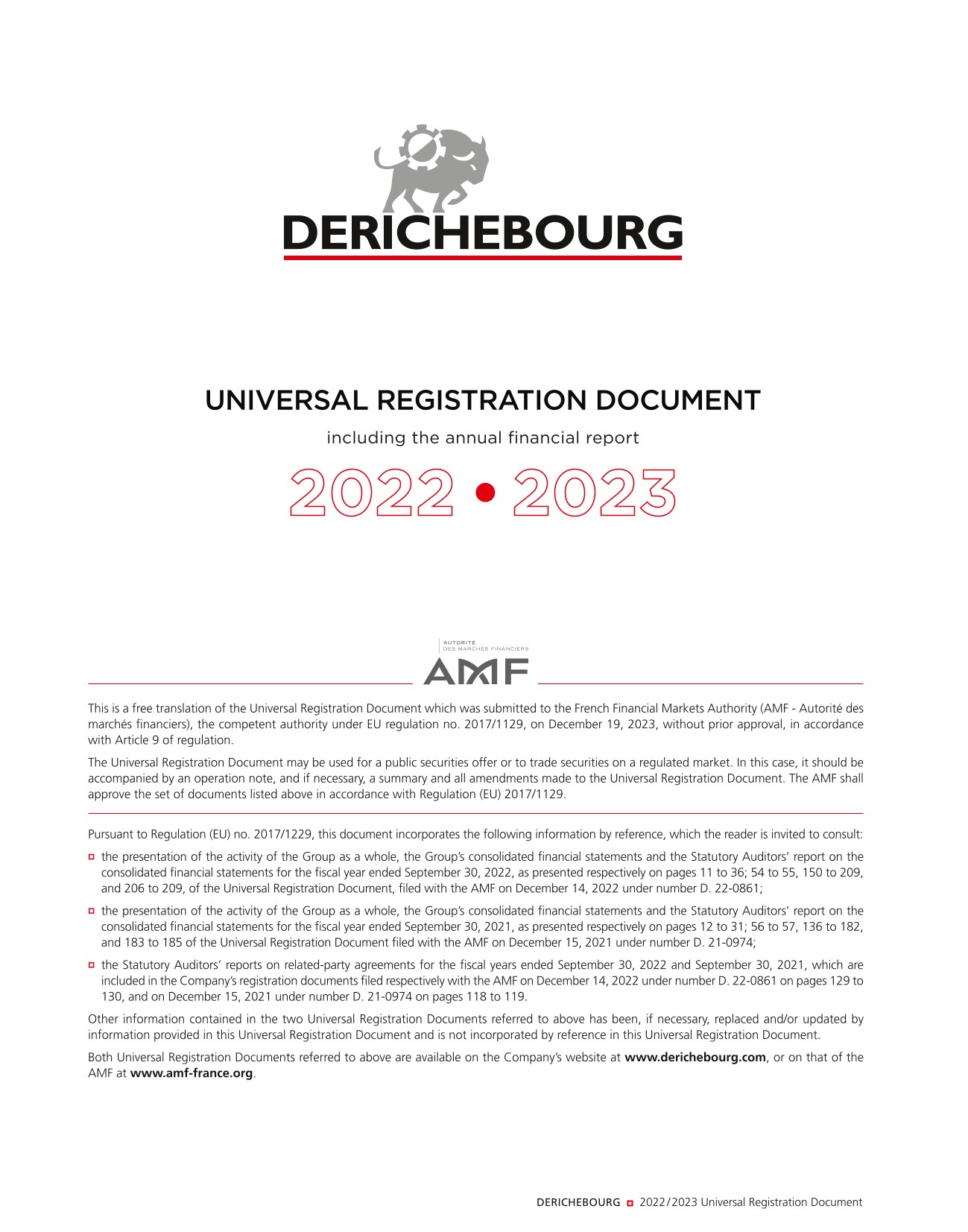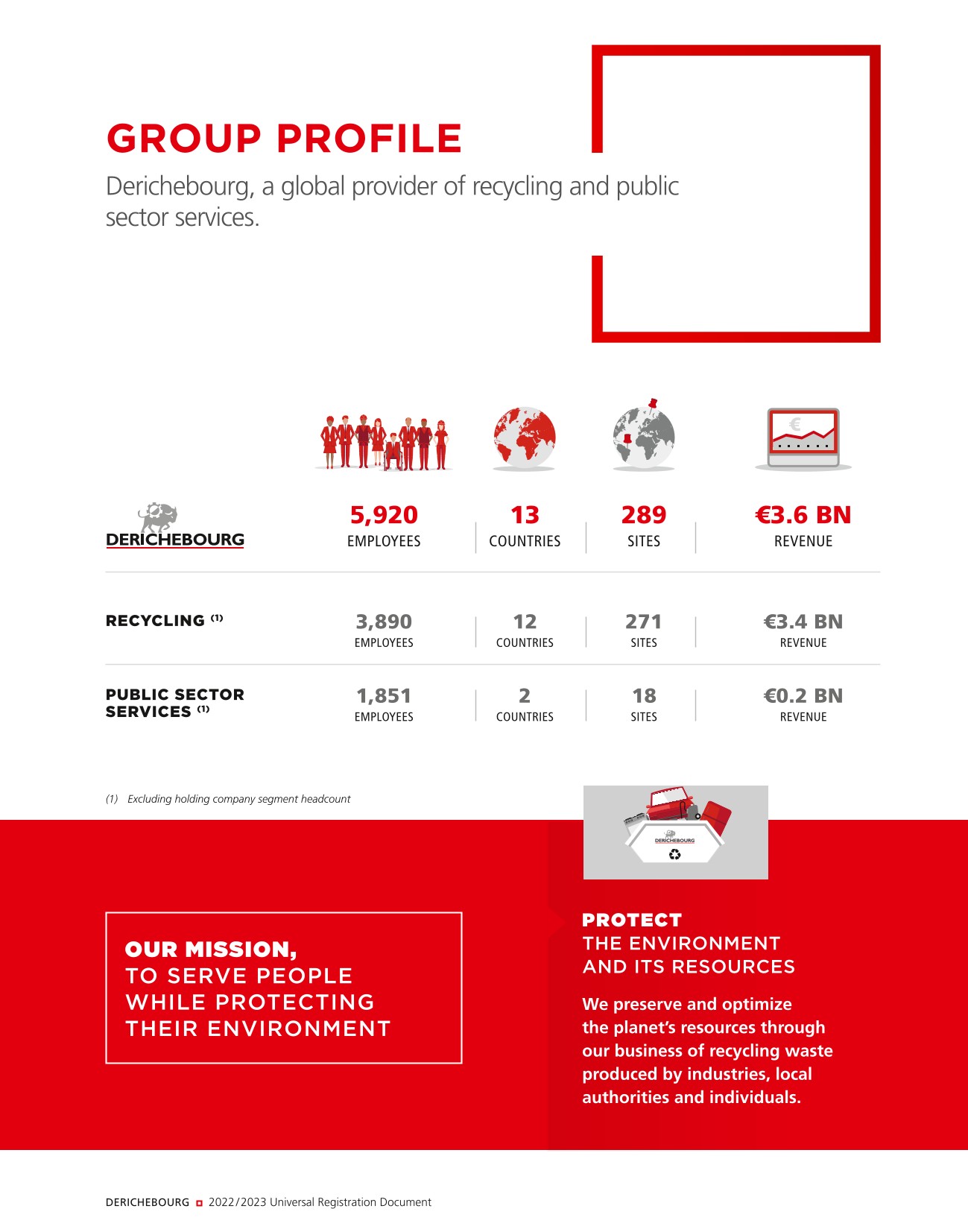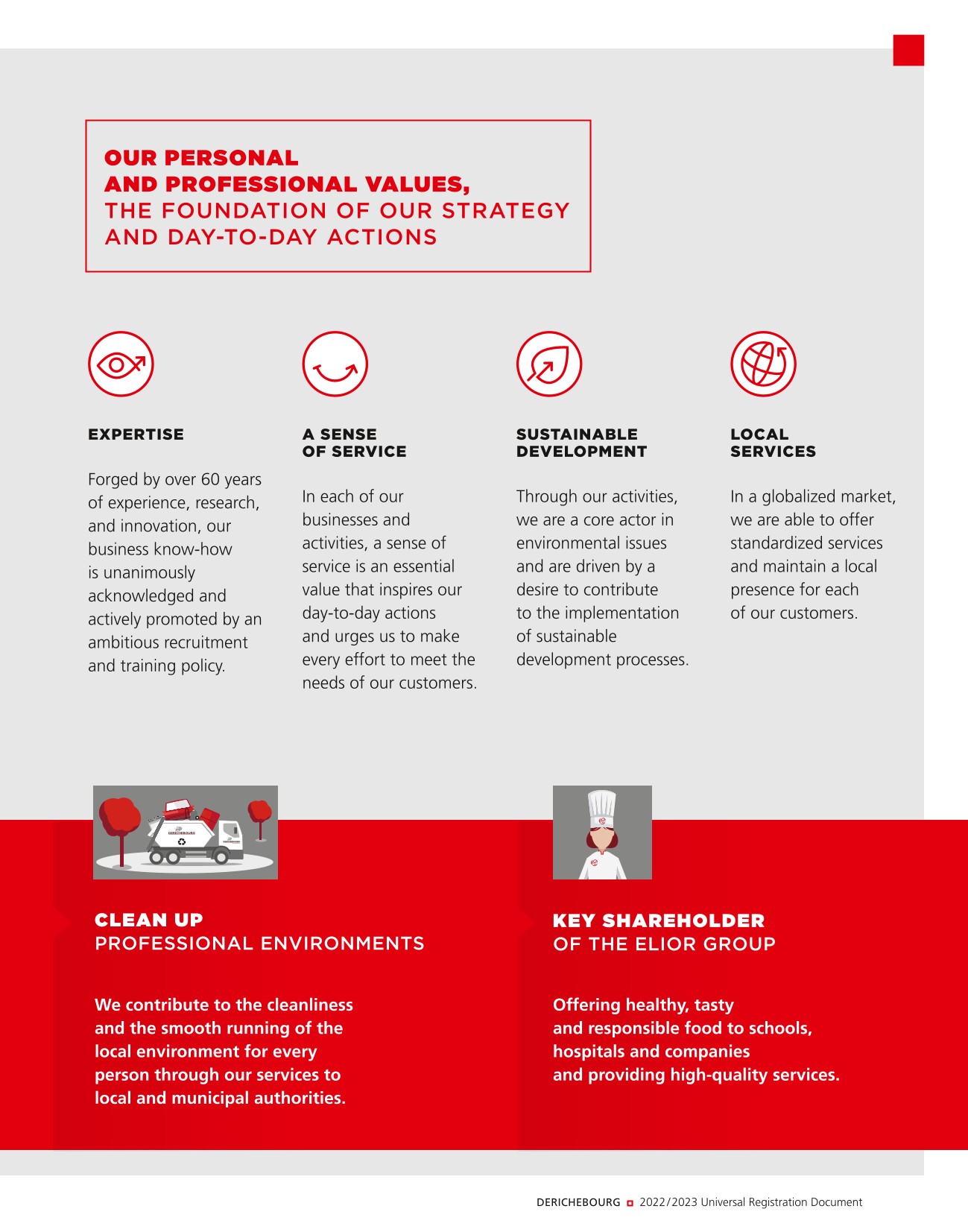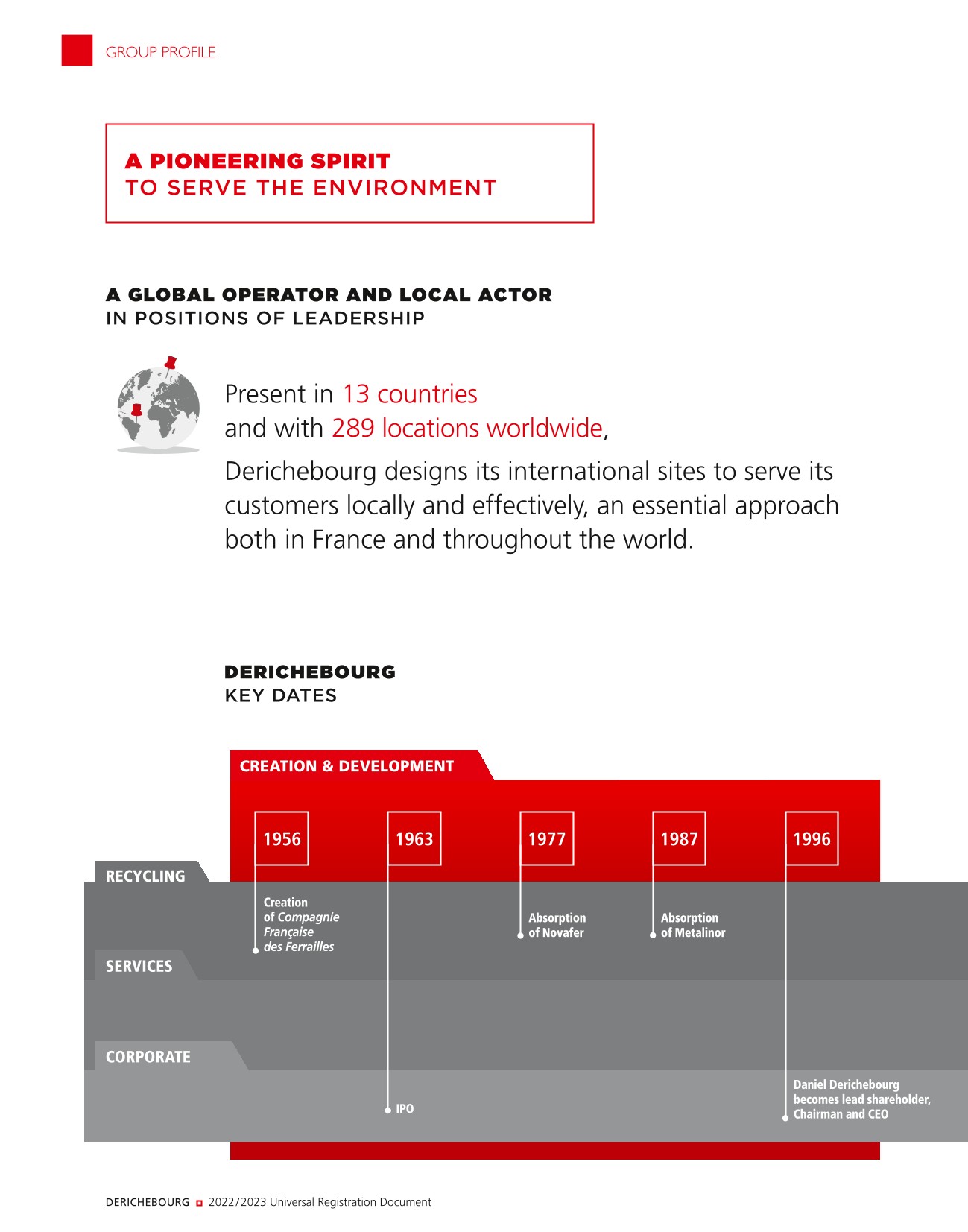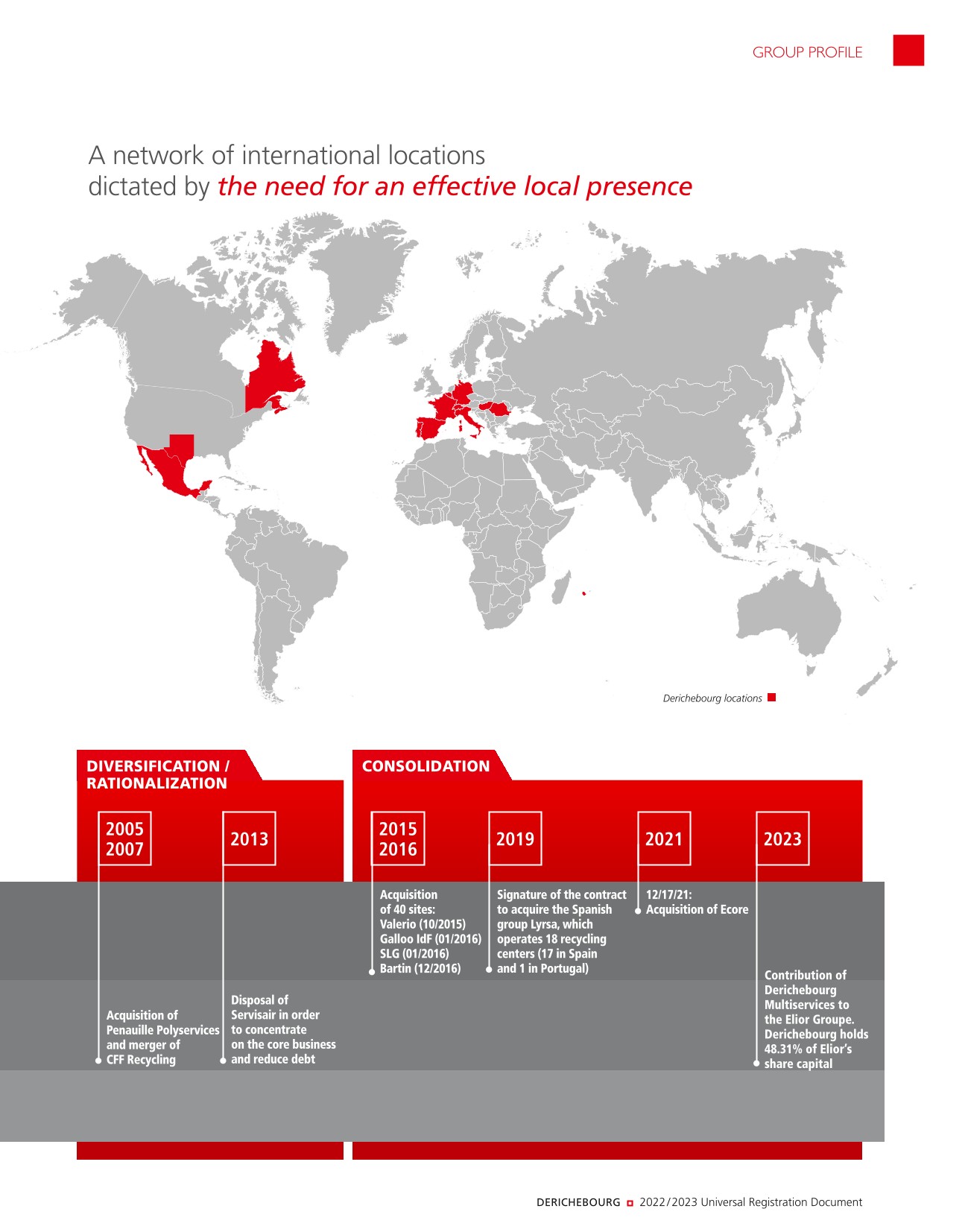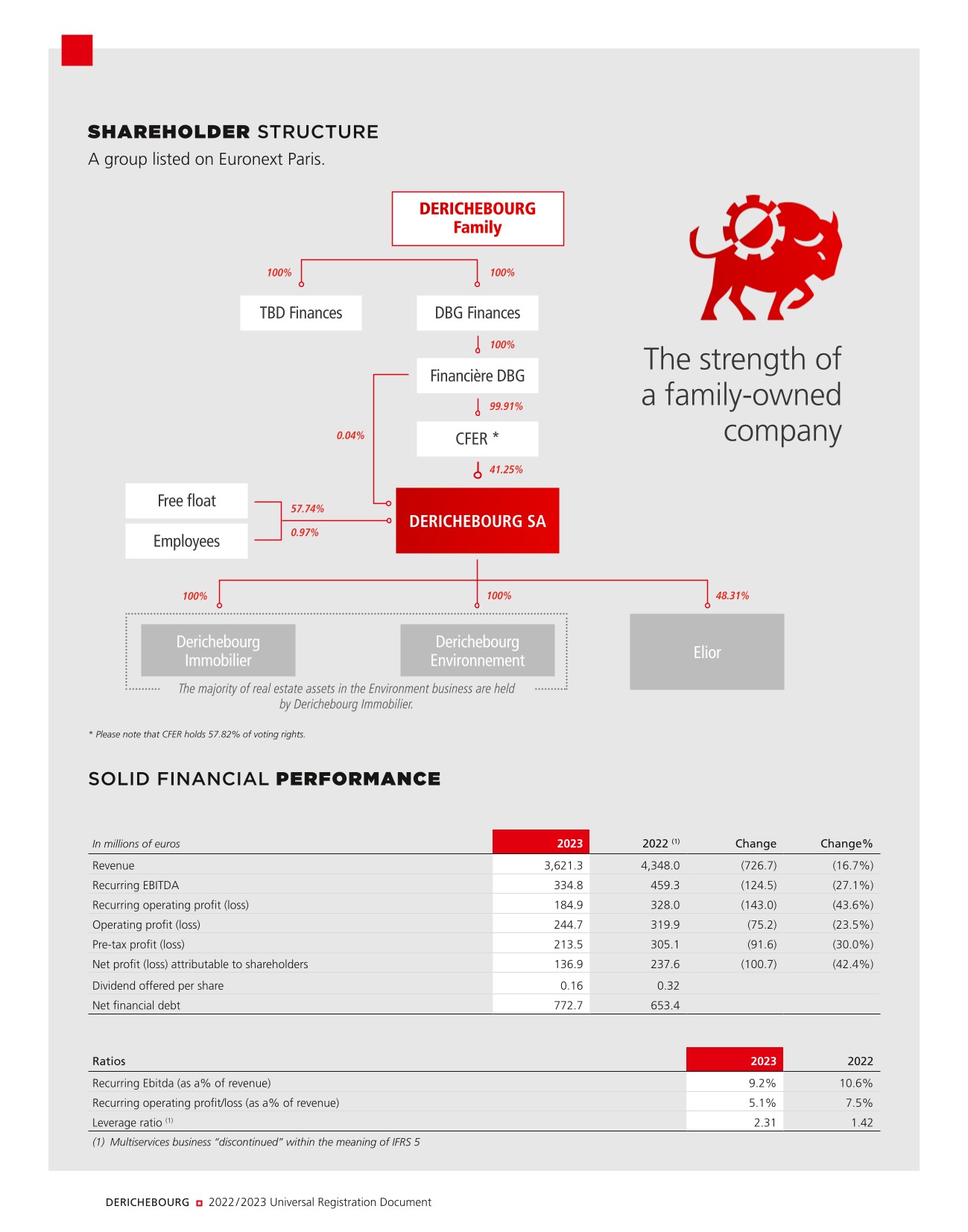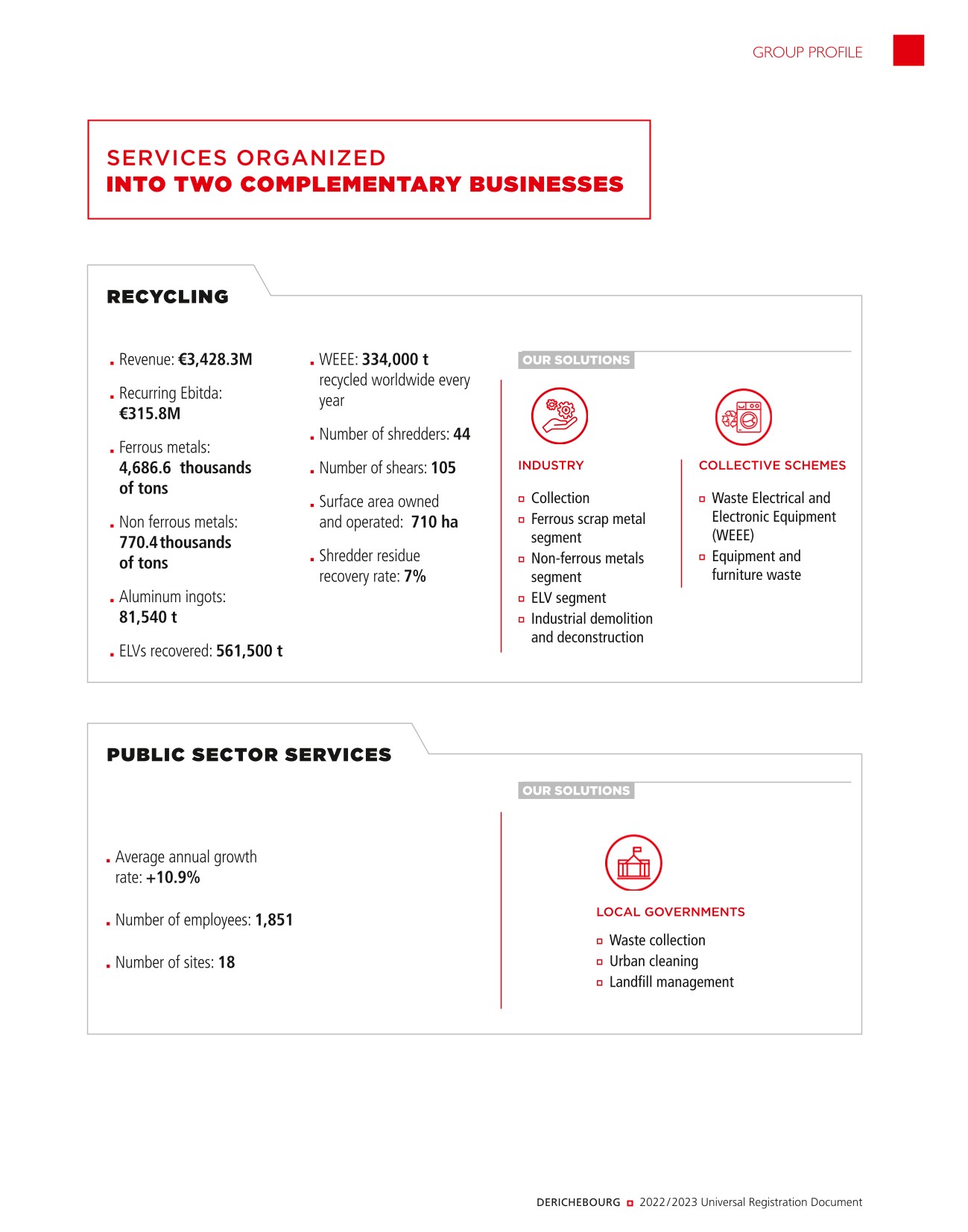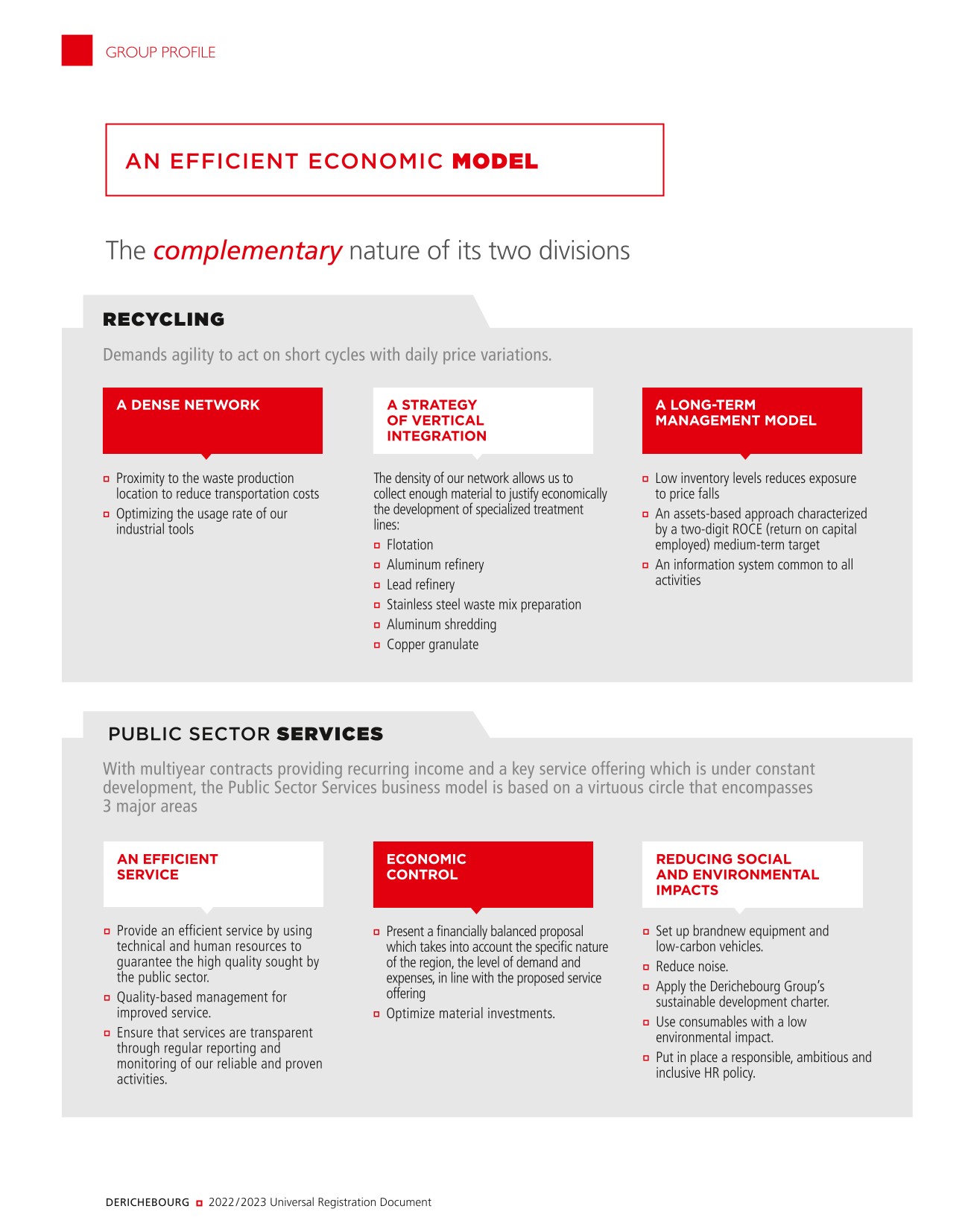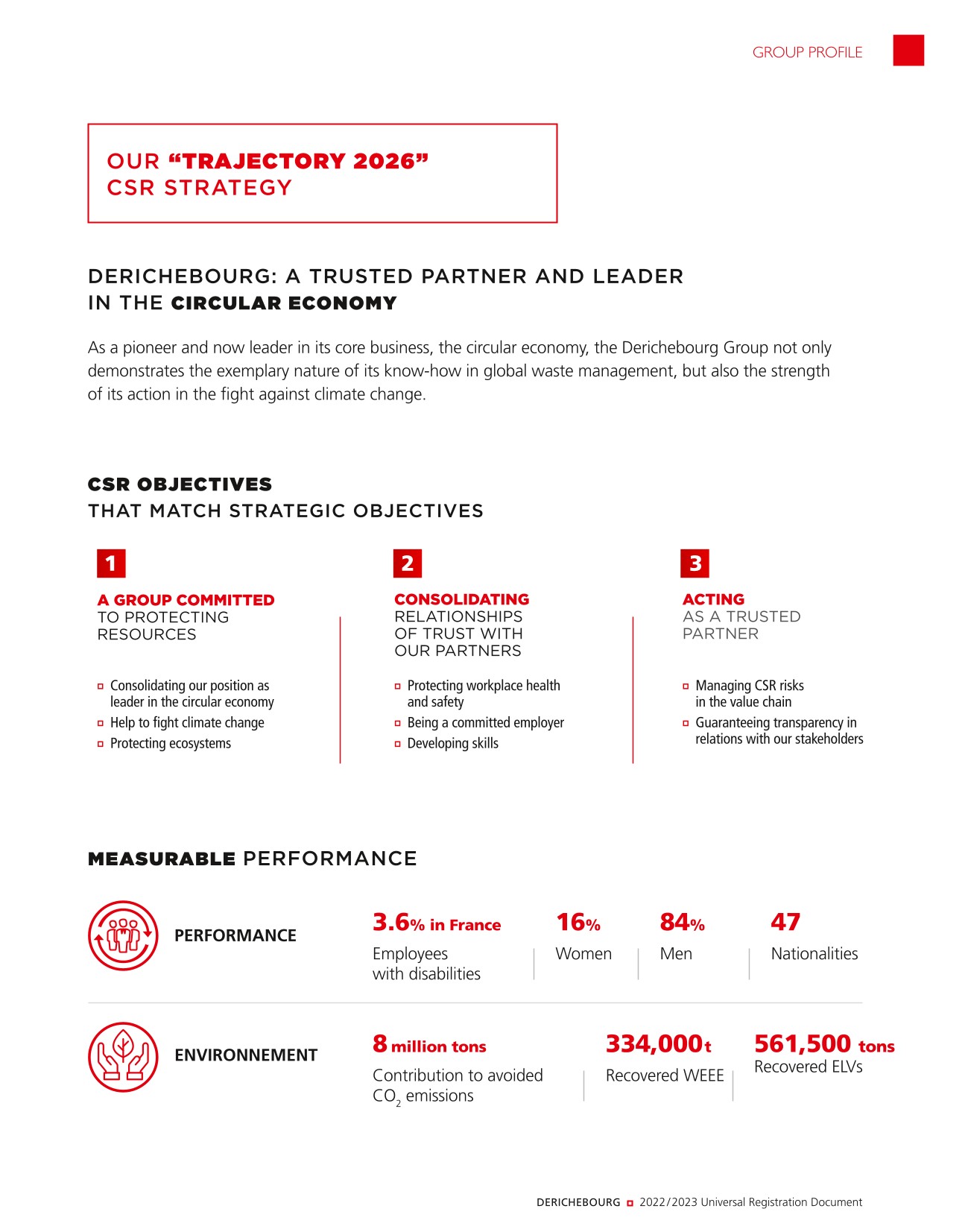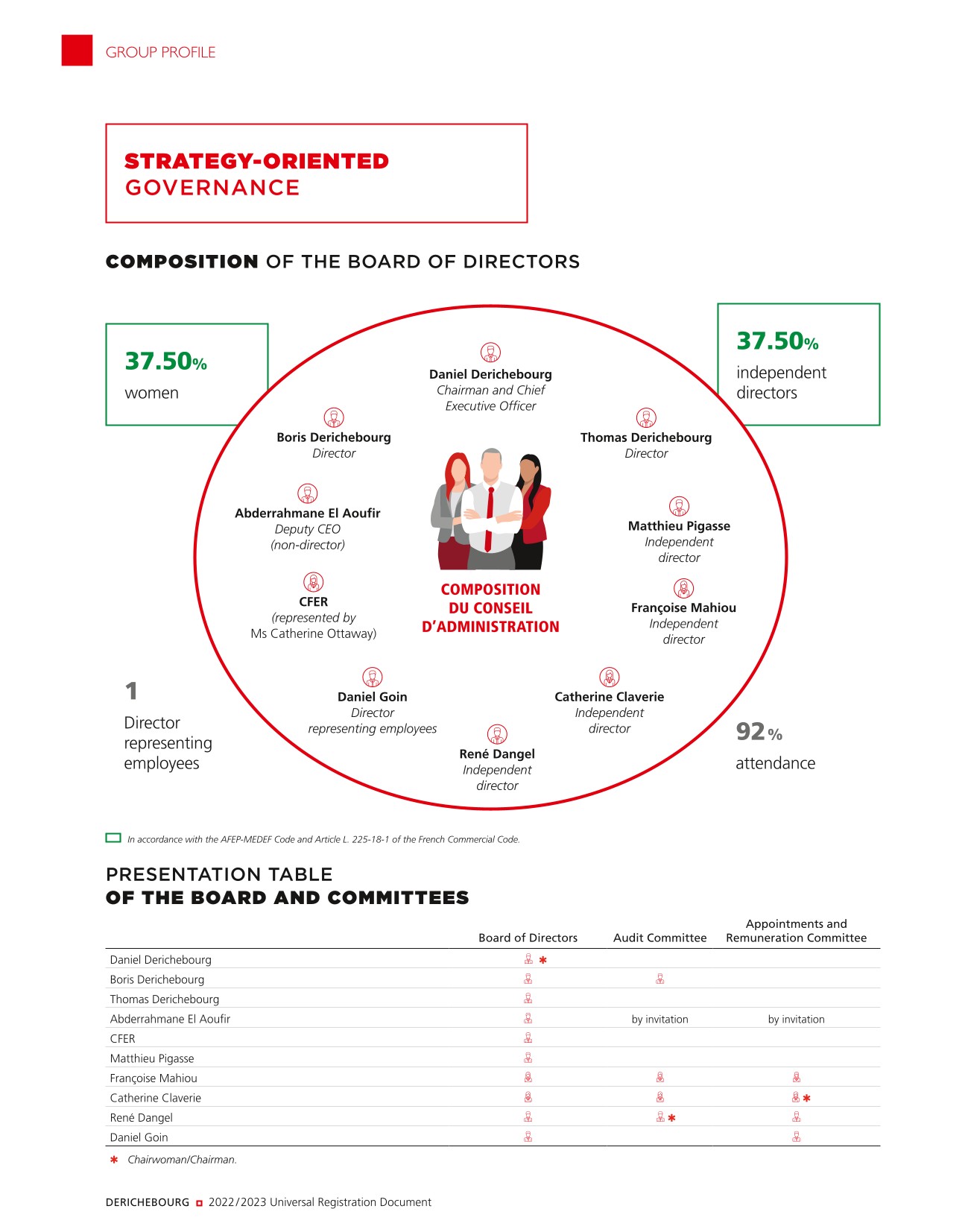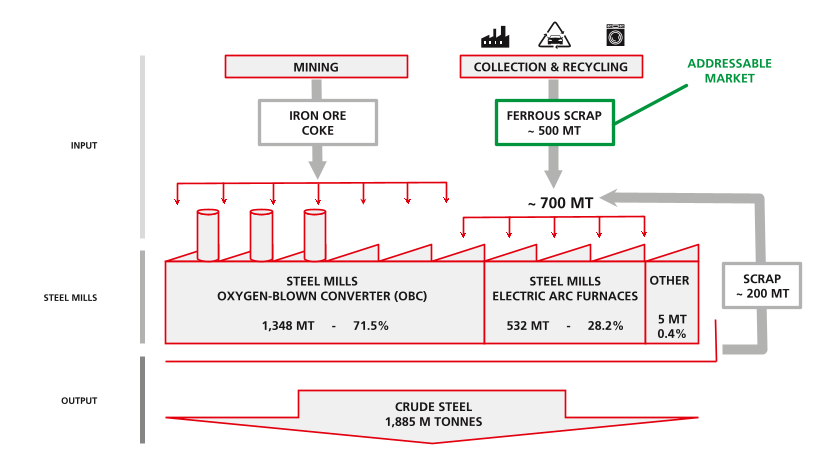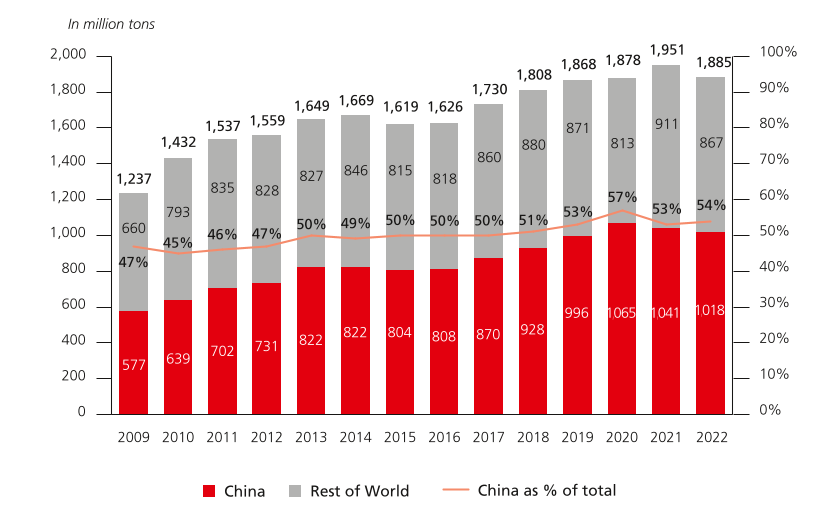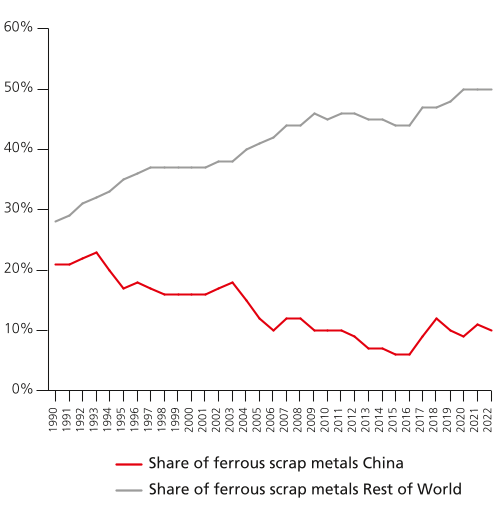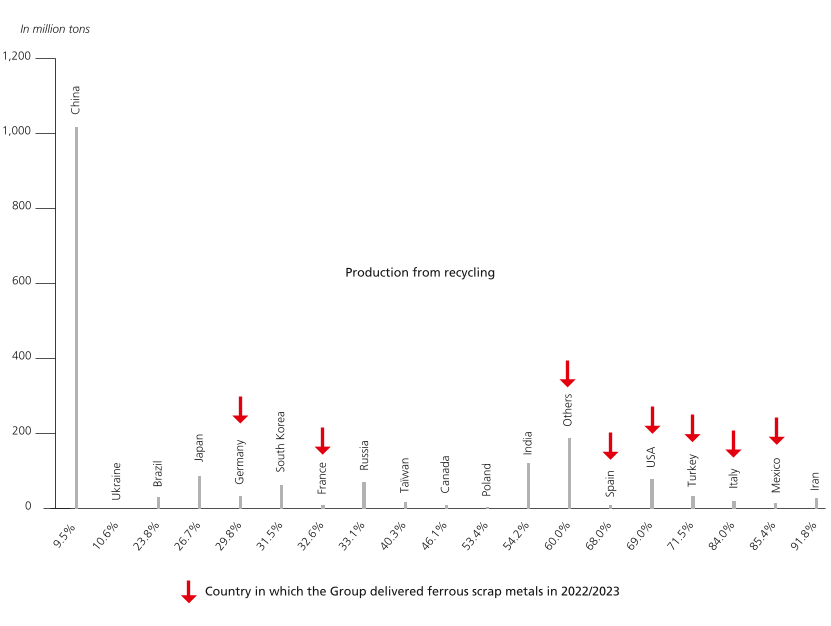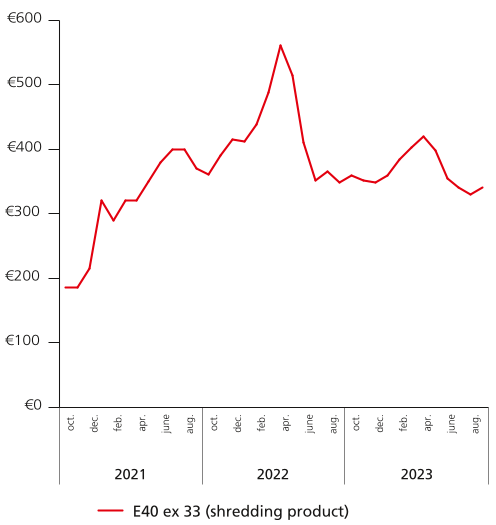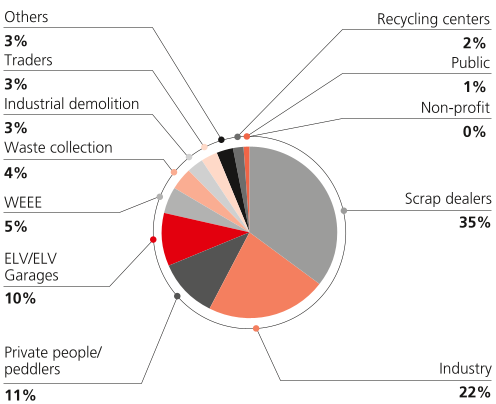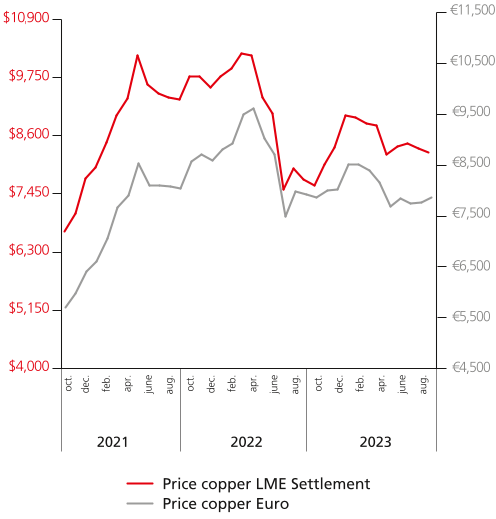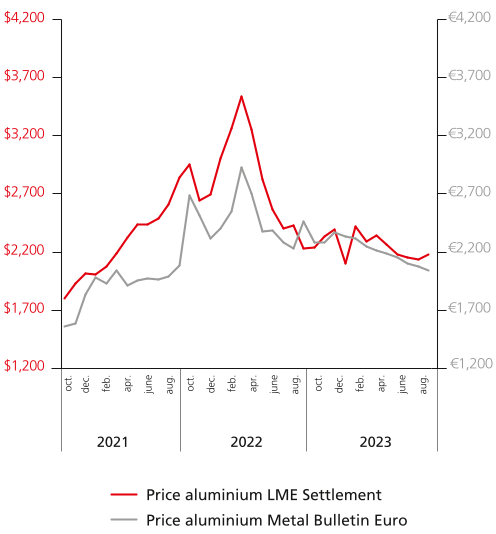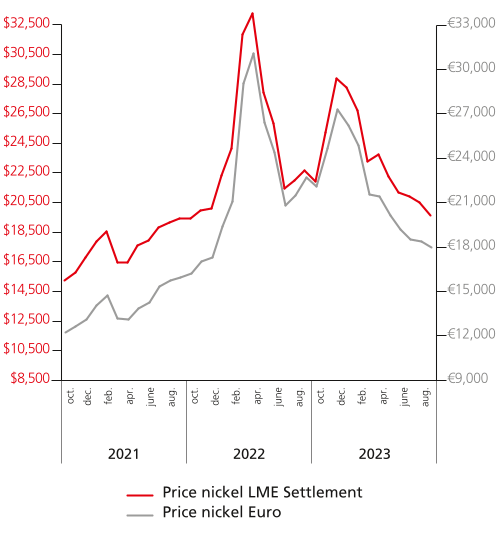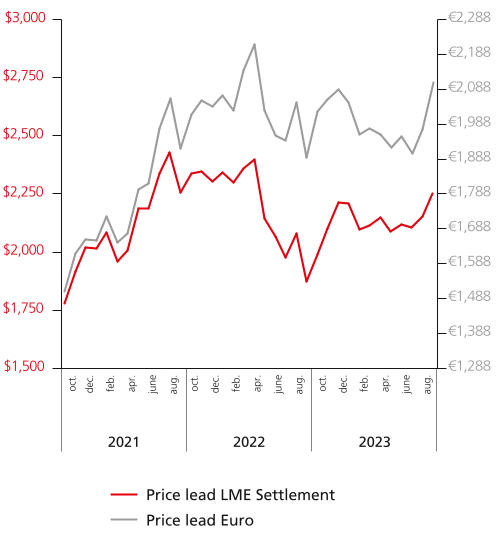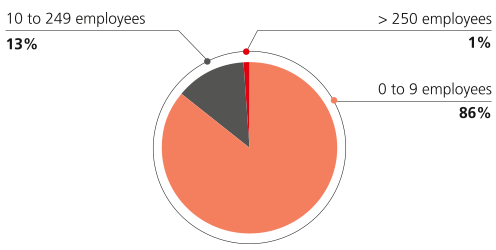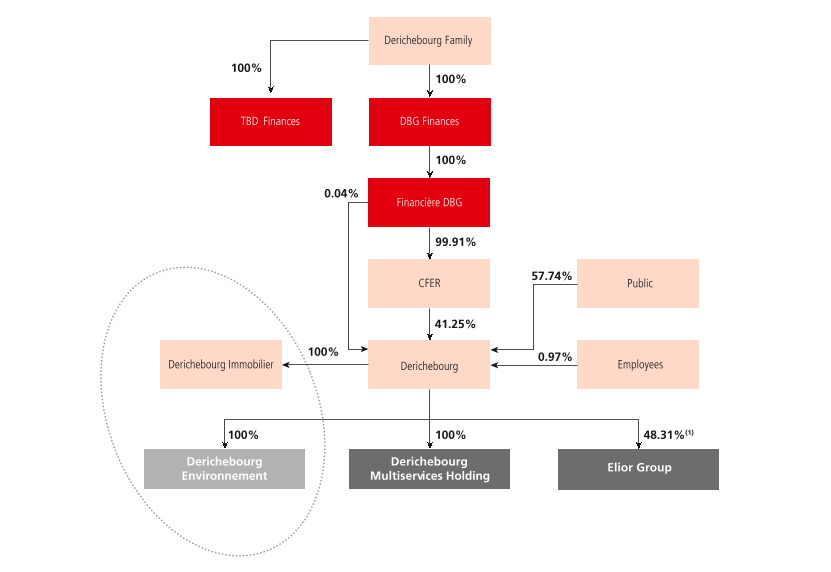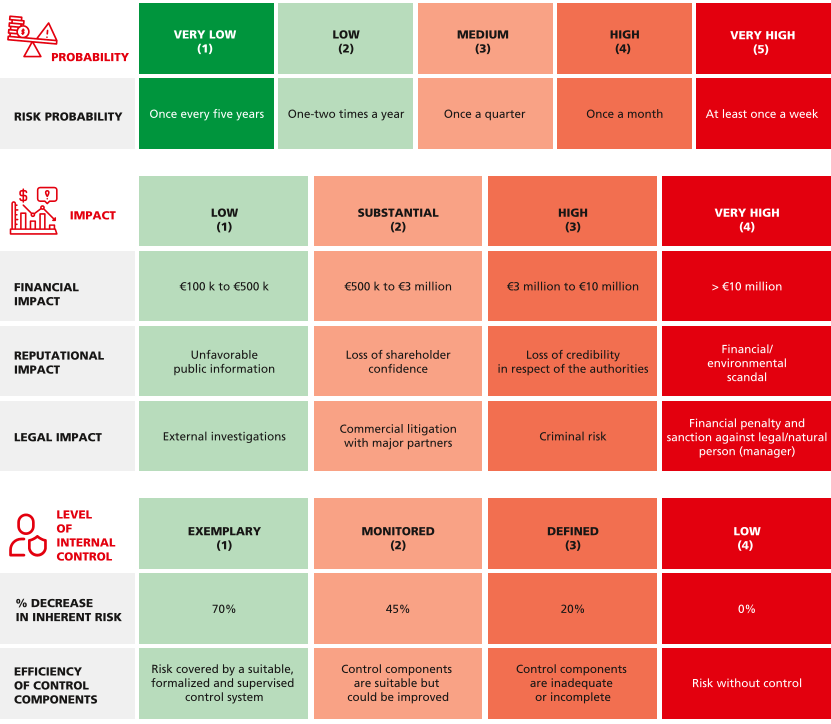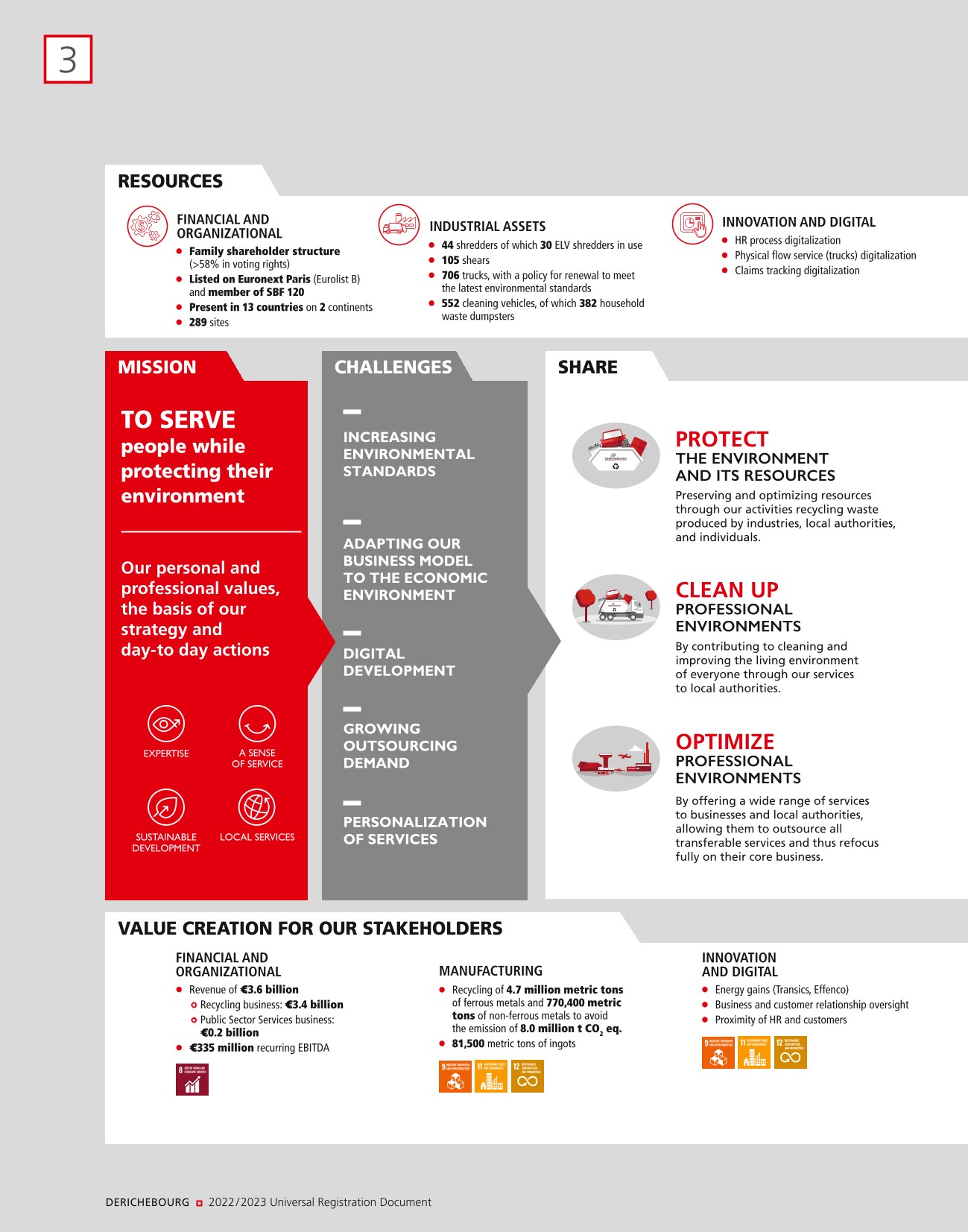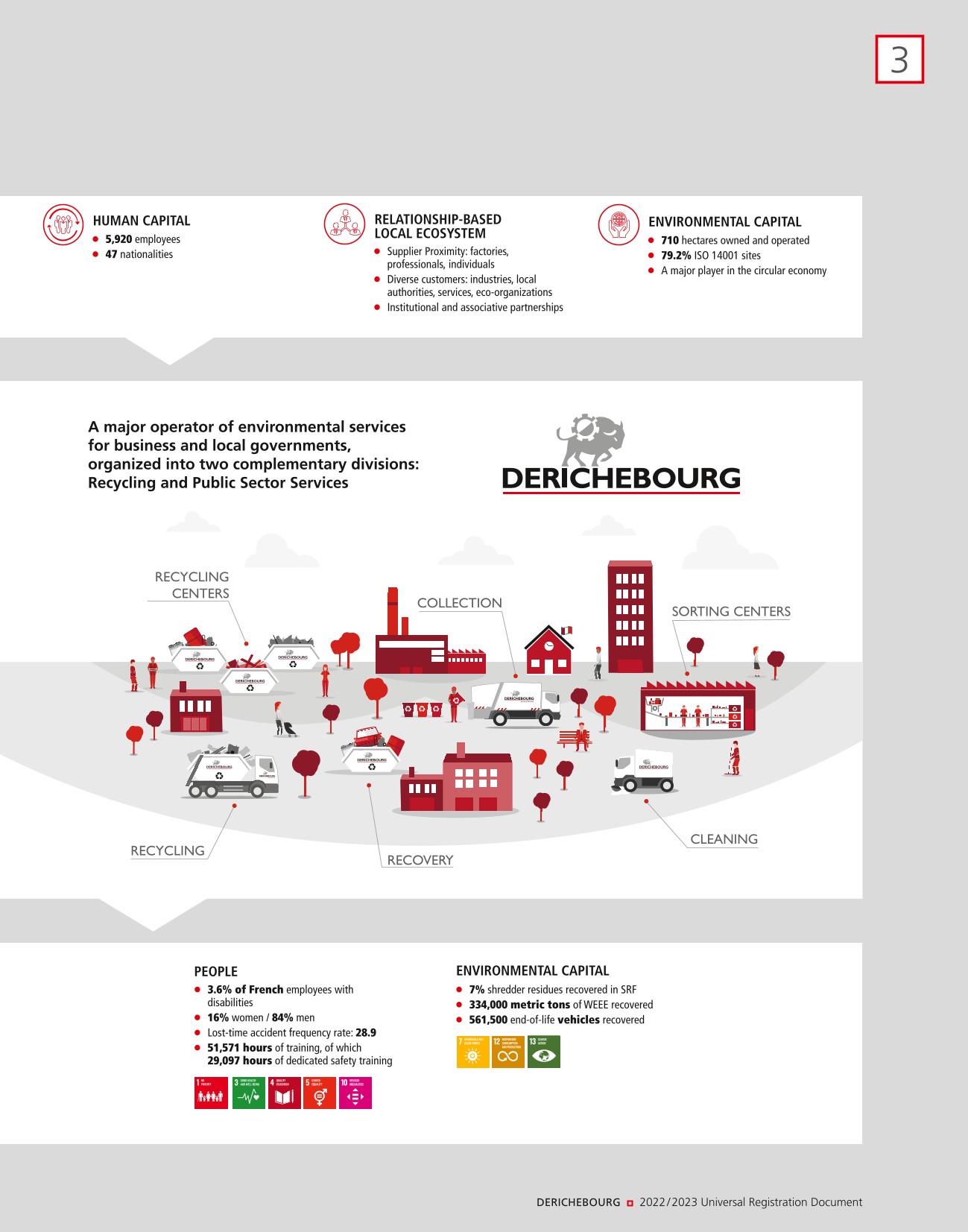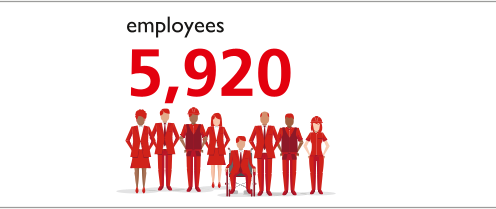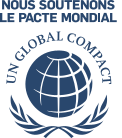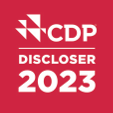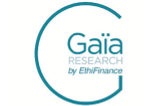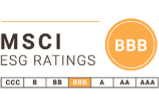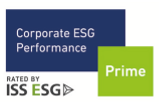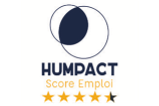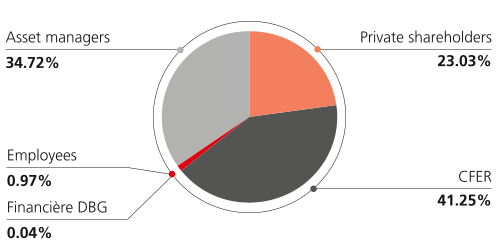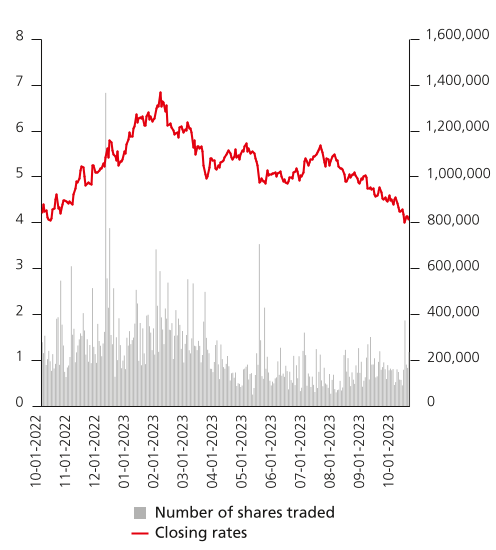URD 2023
-
Presentation of the Group and its activities
-
1.1A global provider of recycling and public sector services
1.1.1Services organized into two businesses
The Derichebourg Group is a leading global provider of waste recycling, mainly metal, and public sector services.
Derichebourg's offering covers the recycling of ferrous and non-ferrous waste, from collection to recovery, and various household waste collection services on behalf of local governments.
Historically, the purpose of the Recycling business is to recover predominantly metallic ferrous and non-ferrous waste from end-of-life products, and process them in the appropriate way to produce raw materials from recycling. This business has become a cornerstone of international environmental protection policy. The business is often tied to the cycles of the steel and metalwork industries, which are the consumer sectors of the products sold by the Group. Since the mid-2000s, the desire to add a more resilient business to Recycling was reflected in the acquisition of Multiservices businesses, which covers cleaning, temporary work, energy and outsourced aeronautics services. In April 2023, the Multiservices division was contributed to Elior Group and paid for by issuing new shares in this French contract catering and business services company, bringing the Derichebourg holding to 48.31%.
Main markets
Revenue by geographical area
2023
2022 (1)
Change
(in millions of euros)
(in %)
(in millions of euros)
(in %)
France
2,541
70%
2,936
68%
(13%)
Other European countries
872
24%
1,166
27%
(25%)
Americas
209
6%
246
6%
(15%)
Total
3,621
100%
4,348
100%
(17%)
- ( 1 )Restated following the reclassification of the Multiservices business as a discontinued operation in accordance with the provisions of IFRS 5, and following the presentation of new operating segments.
-
1.2Recycling business
Since 1956, the business of Derichebourg Environment has been the collection, sorting, recycling and recovering of ferrous and non-ferrous metals in end-of-life consumer goods (automobiles, waste electrical and electronic equipment, etc.), as well as in recuperation material (industrial demolition, for example) and new scrap from metal transformation processes (production waste).
1.2.1The recycling market
1.2.1.1The ferrous scrap metal recycling market
The ferrous scrap metal recycling market is at the interface between an upstream market (waste supply) and a downstream market (steel mill needs).
The annual ferrous scrap metal market is estimated at 700 million metric tons (source: BIR), of which 500 million metric tons are accessible to recycling companies, with the balance comprising steel waste that is recycled internally.
Global steel production has grown 2.2% per year over the last five years. China alone accounts for 54% of global production. After a strong post-COVID recovery in 2021, production in 2022 stabilized at its pre-2020 level, with different trends for different regions of the world.
Blast furnaces consume iron ore, coke, and a small proportion of ferrous scrap metals (10-15%), which reduces greenhouse gas emissions. Electric steel mills consume ferrous scrap metals almost exclusively.
In theory, both types of mills can produce any type of steel. In practice, steel from electric steel mills is used to produce long steel and reinforcing bars. Coils are made mostly at blast furnaces.
As you can see in the previous graph, the share of steel from electric steel mills tends to increase from year to year on a regular basis in countries other than China, and more recently in China. The competitive advantages of steel from electric mills are as follows:
- pless investment;
- pincreased flexibility of use, with the ability to stop and restart production;
- pvery clear environmental benefit (fewer greenhouse gas emissions per metric ton produced with a ratio of 1 to 2.3) and energy benefit (less energy consumed per metric ton produced) advantage compared to blast furnaces, especially in countries where the nuclear share of the energy mix is high;
- plocal supply;
- pease of access to steel production for developing countries thanks to lower investment.
In China, roughly 90% of steel was produced in blast furnaces. To reduce CO2 emissions, it decided to encourage steel production from electric steel mills in the coming years by setting up its own ferrous scrap metal collection network, opening new electric steel mills and closing old blast furnaces.
The ferrous scrap metal market is also sensitive to international steel and ferrous scrap metal trade flows.
The intensity of Chinese and Turkish steel exports significantly influences the European steel market and consequently its need for ferrous scrap metal. Starting in mid-2016, China has sharply reduced its steel exports to Europe due to its strong domestic demand, which has allowed European and Turkish steelmakers to improve their production and sales in their local market. The Group's European customers, and indirectly the Group, benefited from this situation from mid-2016 to end-2018. Since then, exports of Turkish steel to Europe have increased sharply, because of the weak Turkish domestic market as a result of the economic crisis affecting the country. These exports compete with European steelmakers, and, therefore, the Group's main customers by volume. The introduction of quotas in the European Union on imports from Turkey has made the situation more balanced for European steelmakers, who have also benefited greatly from business recovery in 2021.
Turkey is the world's largest importer of ferrous scrap metal. It produces 35 Mt of steel (2002), 72% of which comes from electric steel mills, with insufficient local raw materials, and imports about 20-25 Mt/year of ferrous scrap metal i.e. one quarter of the global trade). Unlike domestic markets, where price negotiations with steel mills occur monthly, the Turkish market buys ships on the spot market (up to 40,000 t). This means that changes in Turkish prices have an effect on the supply regions of the United States and Europe, which have a surplus of ferrous scrap metals. The economic situation in Turkey is also a factor that influences the ferrous scrap metal market.
In recent decades, globalization and the liberalization of international trade resulted in the virtual disappearance of customs tariffs. Consequently, it was marginal demand that influenced world prices. Since the spring of 2018, the situation has changed, with the introduction of customs tariffs by the United States on the majority of steel imports.
The ferrous scrap metal recycling market is perceived as relatively volatile, insomuch as price and volume trends often compound: increased ferrous scrap metal demand by steelmakers will result in scarcity of the additional metric tons sought and put upward pressure on prices. If demand falls, the opposite happens.
End-of-life consumer goods (around 80%, including industrial demolition) and production waste from steel processing (around 20%) provide ferrous scrap metal purchasers with their supplies. The level of general economic activity therefore influences the availability of ferrous scrap metal.
1.2.1.2The non-ferrous metals recycling market (NFM)
The actors in both ferrous and non-ferrous scrap metal recycling are often the same. The volumes of non-ferrous metals processed by collectors are much lower (often one-tenth of the volume) than for ferrous scrap metals. Conversely, unit prices are much higher, as are unit margins.
The tonnage collected in France by NFM operators is 1.74 million metric tons (2022 figures) with an equivalent value of €4.0 billion.
For the French market (69% of tonnage collected by the Group), the breakdown of non-ferrous metals collected by the profession is as follows:
- paluminum and aluminum cables: 26.8%;
- plead and batteries: 13.6%;
- pstainless steel and alloys: 12.2%;
- pcopper, excluding cables and motors: 8.9%;
- pzinc: 7.7%;
- pcopper cables: 6.6%;
- pbrass alloys: 3.2%;
- pother: 21.0%.
NFM to be recycled are found primarily in buildings, packaging, automobiles and industrial equipment. User industries are essentially foundries, refineries and other heavy industries.
Recycling of end-of-life products will become increasingly essential since it is the only source of secondary non-ferrous metal, whereas primary resources are shrinking. Several other factors also favor the development of non-ferrous metal recycling. First, the production of primary ore is nonexistent in many areas of the world. Recycled products are thus the only “surface mine” available and are also a renewable source; in all cases, the reutilization of recovered products leads to savings in raw materials. It avoids CO2 emissions and creates energy savings compared to the production of the same quantity of metal by the primary sector.
Energy savings compared to the production of primary metal are about 60% to 80% for copper and 90% to 98% for aluminum – a clear-cut competitive advantage in a context of soaring energy costs and increasingly severe restrictions on greenhouse gas emissions.
Even so, production cost savings are partially offset by the costs of collection and by environmental restrictions in industrialized nations. These limitations are less restrictive in emerging countries, which increasingly use this type of production and import recuperated products.
Recovering of end-of-life products alone accounts for approximately 35% of global non-ferrous metal production (source: Bureau of International Recycling). The global demand for non-ferrous metals correlates strongly with changes in the global industrial production index.
A major shift occurred in 2018, with China's decision to publish very strict specifications for impurity levels in 19 classes of products (including non-ferrous metals) in order to import them into China. These maximum rates are in practice very difficult to achieve, and the volume of Chinese imports has decreased significantly since the spring of 2018. Consequently, the volumes previously consumed by China have shifted to other markets, resulting in downward pressure on the prices of various non-ferrous metals. The increase in the prices of various non-ferrous metals, which began during the post-COVID recovery of 2021, was magnified in early 2022 with the start of the war in Ukraine and subsequent fears about metal supplies, before falling significantly since then due to downward economic forecasts. The charts opposite summarize the price changes for various metals.
From January 1, 2021, China removed the highest grades of non-ferrous metals (especially copper granulate) from waste status and once again accepted imports of these products. However, it imports almost no solid waste now. This waste has therefore been transferred to other markets (including India, Malaysia and Vietnam).
-
1.3Public Sector Services
As an expert in cleaning, the Derichebourg Group offers local governments a range of services in three main areas:
- pdoor-to-door waste collection and voluntary drop-off points;
- purban cleaning;
- pmanaging recycling centers, transfer hubs and sorting centers.
The efficient management of household waste and urban cleaning is a major challenge for local governments. It determines the quality of life of citizens and the fulfillment of economic, social and environmental obligations that are an increasing burden on them. Poly-Environnement (France) and Derichebourg Canada collect all types of household waste (packaging, paper, cardboard, glass, green waste, food waste, bulky items, residual household waste) using all existing collection methods (door-to-door and drop-off points). These subsidiaries also manage household packaging sorting centers and transfer waste to processing and recovery centers. Lastly, Poly-Environnement offers local governments responsibility for all urban cleaning services (manual sweeping, mechanized sweeping and washing, cleaning of soiled floors, managing public bins and containers, removing graffiti, removing dumped waste etc.).
For example, through its subsidiaries, Poly-Environnement provides door-to-door collection of household and similar waste in six of the ten districts of the city of Paris entrusted to private operators (1st, 3rd, 4th, 7th, 10th and 18th arrondissements).
Public contracts generally last for a period of five to seven years. Local authorities often request new equipment when contracts are renewed.
The Group responds to tenders that give significant weight to technical considerations, thus making it possible to highlight the quality of the service and the resources deployed by the tenderer, not only the lowest price, in order to obtain a solid return on capital employed.
The Poly-Environnement entities and its subsidiaries were historically owned by Derichebourg Multiservices, and were transferred to Derichebourg SA prior to the contribution of the Multiservices division to the Elior group in April 2023.
1.3.1The waste collection market
- pAfter Germany, France is the second largest producer of household waste in Europe.
- pPer capita, a French person produces an average of 582 kg of waste, which places France in the European average. Over the 2007-2017 period, waste production per inhabitant decreased by 2%, while the overall quantity of household waste continues to increase due to the increase in the population (according to a study by ADEME on household and similar waste).
The market is composed of many small players (0 to 9 employees), which is due to the local nature of waste collection and treatment. In 2015, the breakdown of companies based on number of employees was as follows:
-
1.4Stake in the Elior Group
Derichebourg SA holds a 48.31% stake in Elior Group, a leader in contract catering and Multiservices.
1.4.1Elior history
The Group was created in 1991 by Francis Markus, Robert Zolade and 300 executives who joined forces to acquire a 35% stake in the capital of Société Générale de Restauration, a subsidiary of the Accor group.
In 1997, the Group became the French leader in concession catering, and the following year adopted the name Elior.
In 1999, the Group decided to expand in Europe, through numerous acquisitions in the United Kingdom, Spain and Italy. A number of external growth operations were carried out in these countries during the 2000s.
In 2013, the Group entered the American market with the acquisition of TrustHouse Services, one of the leading catering companies for the education and healthcare markets in the United States. A number of new acquisitions followed in the second half of the decade, to expand the Group’s presence in this area.
In 2022, Derichebourg SA acquired a 24.36% stake in Elior Group through the purchase of shares belonging to the historical shareholder Robert Zolade and through market acquisitions.
-
1.5Strategies and objectives
1.5.1The Group's strategy in the Recycling business: “A dense network”
The Group is currently the 4th largest player in the world (and third in Europe) in terms of revenue, behind SIMS Ltd, EMR and TSR.
- pconsolidate our position as leading supplier in steel and metallurgy by delivering products in line with customer specifications and expanding our customer base, especially for ferrous scrap metal;
- pimplement the best sorting technologies available, so that the full added value of the various products is maintained, and reduce the share of residue headed to landfill;
- phave a management team that implements the same strategy uniformly throughout the Group, and train employees;
- pupdate the Group's IT tools while leaving intact the main features, which make it one of the most relevant tools in the market (knowledge of inventory and real-time margins at all Group sites);
- pdevelop niche businesses where there are fewer players, such as induced heavy metals plant, aluminum or lead refining, and cold preparation of mixtures for steel mills that produce stainless steel. The Group also seeks to develop additional sorting for the non-ferrous metals that result from the shredding process. Ultimately, the Group aims to earn 20%-25% of revenue from the Recycling business in these segments;
- pexpand the collection network in France and abroad by being present in each country as either a national or regional leader and explore external growth opportunities over the long term. The Group is well positioned to be a consolidator for a market at cyclical lows.
-
1.6Group structure
1.6.1Structure and summary organization chart of the Group and its shareholders
- pequity interests in two parent-holding companies, Derichebourg Environnement and Poly-Environnement, which each control the operating companies in the appropriate division;
- pshares in DBG Holding GmbH, which owns the Recycling business in Germany;
- pand shares in Derichebourg Immobilier, which holds the majority of the real estate assets of the Recycling business.
- pAcquisition of a 48.31% stake in Elior Group
The financing of the Group's subsidiaries is provided for the most part centrally by Derichebourg, via the syndicated loan set up on March 19, 2020, for a residual amount of €250 million (see note 4.11.1.5 of the notes to the consolidated financial statements), the Green Bond of €300 million, and the EIB loan for the residual amount of €104 million.
-
Risk factors and internal control
-
2.1Risk factors
2.1.1Risk analysis and monitoring process
2.1.1.1Methodology for establishing and validating the Group's risk mapping
A mapping of the Company's general risks was prepared during the 2018 fiscal year and is updated annually. It will be updated at regular intervals by Internal Control and the Group's Chief Financial Officer, in collaboration with the operational and functional risk-bearing departments.
The risk map for 2022-2023 was presented to General Management, which validated the main risks and the implementation of the associated action plans. This mapping is presented to the Audit Committee on an annual basis.
For informational purposes, the Group's risk mapping also includes Sapin II (anti-corruption) and CSR risks.
2.1.1.2 Criticality matrix used
-
2.2Insurance
The Group is particularly conscious of the need to prevent risks and allocates significant resources and a considerable budget to personnel training, particularly on fire risks, site security and a range of programs covering prevention, protection, security, health and the environment.
This risk management nevertheless also includes taking out insurance policies with financially sound international insurance companies. It is the responsibility of the Group’s Insurance Department, which is managed by the parent company, to identify the risks for each business sector, establish the correct balance between insurance requirements and guarantees to be entered into, as well as the acceptable levels of policy excesses and ceilings.
This is why the decision was made, from an economy of scale perspective, to negotiate policies at the central level. Consequently, all Group entities are covered by so-called “master” insurance policies that are translated into local policies in accordance with the regulations and risks identified locally. Similarly, the Insurance Department uses “master” underwriters that act as the conduit to local underwriters in the countries where the Group operates.
In this way, the Group guarantees harmonization and an optimum level of security in its insurance policies, which it reviews whenever necessary, on the basis of information fed back by subsidiaries and claim monitoring. This takes place on at least an annual basis.
Main insurance programs
The Group's insurance policy is based on more than ten programs, including the following main policies:
- pGeneral Public Liability Insurance: covering third-party criminal and contractual liability incurred by the Group in the event of personal injury or material and intangible damage likely to arise in the course of business operations or after delivery;
- pSpecific Public Liability Insurance for pollution risks;
- pProperty Accident Insurance: covering direct accidental and sudden material damage to the insured property. This insurance is provided by the captive reinsurance company, Derichebourg Ré;
- pVehicle Fleet Insurance: working from a common base, these are essentially policies adapted to the needs of local regulations;
- pTransportation Insurance: covering claims arising from maritime, rail and ground transportation between the Group's plants and its customers;
- pCharterer and owner's goods liability insurance, Defense and Appeal;
- pDirectors’ Liability Insurance;
- pWorkers’ Compensation Insurance, to cover work-related accidents and illness; this system is specific to the United States;
- pCyber/Fraud Insurance, covering extortion requests, data security, computer system availability, fraud and forgery;
- pCredit Insurance, under the responsibility of the Group Finance Department.
-
2.3Internal control
2.3.1Internal control objectives
The purpose of internal control is to prevent and control risks inherent in the Company’s business and the risk of errors and fraud in the accounting and financial fields, in particular. The purpose of control procedures is to ensure that the actions of management and completion of transactions, as well as personal behavior, fall within the framework defined by the General Management guidelines.
-
Extra-financial performance
-
3.1CSR approach and strategy
On April 18, 2023, Elior's Combined General Meeting approved the contribution of the subsidiary Derichebourg Multiservices to the Elior group in exchange for 23.95% of the capital. This contribution ultimately gives Derichebourg a 48.31% stake in Elior Group. As this investment is consolidated using the equity method, Derichebourg Multiservices is no longer included in the reporting scope.
The Ecore Group sites acquired in December 2021 were consolidated for the first time in the full 2022-2023 fiscal year, except for the eight sites sold on January 2, 2023 as part of the decision to authorize the acquisition of the Ecore Group, issued by the European Commission on December 16, 2021. These were consolidated in the first quarter only.
3.1.1Analysis of CSR risks
The risk analysis has enabled potential risks to be identified in the social/societal, environmental, human rights, anti-corruption and tax evasion areas. The management and control systems in place make it possible to mitigate these risks and define the priority actions set out in the new “Trajectory 2026” roadmap. This roadmap links the previous one called “Concretely Responsible 2018-2022” and the future obligations relating to the implementation of the Corporate Sustainability Reporting Directive (CSRD), which will replace the current Extra-financial Performance Statement (DPEF).
This paragraph also meets the provisions of law no. 2017-399 of March 27, 2017 on the duty of vigilance presented in section 3.7.
In 2022, a single risk mapping was drawn up which incorporates CSR risks (social, societal and environmental).
This mapping, updated in 2023, enables risks to be identified, analyzed and ranked in order to prepare appropriate action plans using the following method:
- pidentification of risk type;
- pprioritization and scoring of risks arising from the impact and probability of occurrence of these risks;
- pidentification of internal control systems to assess the level of risk management.
Identified risks are addressed by the actions and controls described in the CSR roadmap, with the aim of mitigating and managing them.
- poperational risks: major accident (fire, physical injury etc.);
- penvironmental risks: climate change; air and water pollution, etc. (including IED regulations);
- phuman resources management: recruitment and management of key positions;
- pbusiness ethics: corruption;
- penvironmental legislation: landfill ban for shredder residues, or prohibitive increase in the French general tax on polluting activities (TGAP).
The pandemic risk remains in the risk analysis. The crisis management system set up during the COVID-19 epidemic has been retained, and can be triggered if necessary.
As part of its CSR risk mitigation actions, the Derichebourg Group is rolling out its new “Trajectory 2026” roadmap.
The risks listed above and presented in this chapter are the items identified as material at the end of the risk analysis.
In view of its business activities, the Group does not provide details on the following topics, as they are deemed to be immaterial:
- pactions against food waste;
- pactions against food insecurity;
- prespect for animal welfare;
- presponsible, fair and sustainable food practices;
- pactions aimed at promoting the connection between the nation and the army and supporting commitment in the reserves;
- pactions to promote physical activity and sports.
-
3.3A Group committed to protecting resources
3.3.1Consolidate our position as leader in the circular economy
The Derichebourg Group is one of the world leaders in metal waste recycling, and a leading player in household waste collection. Due to the nature of its historic scrap metal recycling business, Derichebourg Environnement is helping to preserve natural resources (iron ore, copper, bauxite, etc.) while reducing the quantity of waste eliminated. Metal waste, first of all, undergoes a sorting process. That not requiring any processing is grouped directly by quality, then resold. Ferrous scrap metals that need to undergo an industrial preparation process before being processed in steel mills are either sheared or cut (thick ferrous scrap metals), or shredded (light ferrous scrap metals or those mixed with other materials).
During the 2022-2023 fiscal year, the Derichebourg Group recycled 4.7 million metric tons of ferrous waste and 770 thousand metric tons of non-ferrous metal waste. In particular, it processed 561,500 metric tons of end-of-life vehicles (ELVs) and 334,000 metric tons of waste electrical and electronic equipment (WEEE). In doing so, it has avoided the release into the atmosphere of the equivalent of 8 million metric tons of CO2.
In line with this metal waste processing activity, Derichebourg has vertical integration in aluminum and lead thanks to two aluminum refineries in France and one in Spain, as well as a lead refinery in Spain. The start-up of a new furnace in the summer of 2022 increased the production of lead ingots.
The Group is also a leading player in the production of copper granulate from used cables. It has had a second-generation shot-blasting line since September 2023.
In order to achieve a high level of recovery of treated waste, the Group continuously invests in the acquisition of new technologies, new facilities and their maintenance. These investments amounted to €260 million for the 2022-2023 fiscal year.
In July 2019, Derichebourg signed a €130 million loan agreement with the European Investment Bank (EIB) in order to contribute to the long-term financing of a multi-year investment program in France in the area of recycling and the circular economy. Investments under this multi-year investment program will mainly cover improving recovery rates of materials processed, adapting shredders to use the best available techniques (in the area of water treatment, smoke treatment and noise protection) and reducing the consumption of fossil energies (trucks and handling machinery).
3.3.1.1Improving the recovery of waste treated at our facilities
The draft law on combating food waste and the circular economy published on February 10, 2020 is at the center of French political debate. Arising from the circular economy road map published in 2018, this legal text includes core provisions for the recycling industry, such as setting rates for the incorporation of recycled raw materials in new products, improving the way that product recyclability is taken into account, and revising the extended producer responsibility segments.
Given the lack of channels at waste storage facilities, solutions have to be found in order to grant special access for waste requiring final disposal following sorting and recycling operations. In line with the target of halving landfill waste by 2025 against a 2010 baseline, the reduction of authorized capacity at storage centers has had an impact on the entire recycling value chain since 2018.
At the same time, a strict framework has been put in place to limit recyclable waste access to non-hazardous waste sites(1). The storage of non-hazardous non-inert recyclable waste will be gradually phased out between January 1, 2022 and January 1, 2030. The Decree of September 16, 2021 relating to the reduction in disposal and the obligation to provide proof of sorting and the Decree of September 16, 2021 relating to the procedure for the control of waste entering non-hazardous waste sites provide a framework for this provision, together with the obligation to monitor waste unloading by video, in force since July 1, 2021.
Limiting the quantity of shredder residue produced
Following the sale of eight sites, including four shredders, as part of the European Commission's decision to authorize the acquisition of the Ecore group, the Derichebourg Group now operates 30 shredding lines dedicated to mixed metal waste worldwide, including 18 in France. The advantage of this technology is that it allows ferrous metal parts to be separated from non-ferrous metal parts, a mixture containing metals, plastics and shredding residues.
The “surface mines” which Derichebourg Environnement operates are becoming more complex with technological advances in retail products. In parallel, legislative changes in Europe, and particularly in France, are imposing increasingly strict recycling and recovery rates (waste electrical and electronic equipment, end-of-life vehicles, etc.) which require constant Group investment in R&D. Its R&D efforts enable it to operate sorting and separation technologies that set benchmarks in the recycling industry.
For a long time, shredding residues, plastic and even some undetected metallic residues were sent to landfill facilities. Historically, up to 25% of the volumes sent to shredder thus ended up in landfill. For many years, and particularly since the improvement in detection equipment (driven induction, infrared detection, X-rays, optical sorting, etc.), the Group has been endeavoring to reduce the proportion of residues consigned to landfill facilities. During the fiscal year, the Group's shredding lines produced 572,550 metric tons of residual parts (-1.6% compared to 2021/2022).
Decontamination and pre-shredding dismantling operations (bumpers, tanks, windscreens in end-of-life vehicles, concrete counterweights from washing machines, etc.) also reduce the amount of shredder residues produced.
During the fiscal year, the Group's sites made it possible to recover the following through pre-shredding dismantling operations:
- p1,528 metric tons of bumpers (polypropylene);
- p1,879 metric tons of tanks (polyethylene);
- p11,005 metric tons of concrete.
The recovery of plastics is one of the major challenges for the Group, particularly in the context of the new regulations on end-of-life vehicles (ELVs) and waste electrical and electronic equipment (WEEE). The Group has set itself the target of reaching 25,000 metric tons of recycled plastics per year by 2026, and is working on the development of a new post-shredding sorting line. During the fiscal year, the Group recycled 20,034 metric tons of plastics.
End-of-life vehicles (ELV) segment
French legislation transfers responsibility for achieving recycling and recovery rates to the combination of ELV center-ELV shredder. Each shredder deals with several ELV centers, which are responsible for vehicle decontamination before shredding. The recycling rates presented below were calculated for each shredder, then a weighted average (according to the number of ELVs processed) was calculated for the Group. The data is taken from ADEME (the French green transition agency).
The table below presents average reuse and recycling rates, and reuse and recovery rates achieved by the Group's French shredding sites overall.
It should be noted that the figures provided in this report correspond to the declarations relating to the destruction carried out during the 2020 calendar year, taking into account the delay in the certification of declarations and ADEME's publication of the official data.
The average reuse and recovery rate for ELVs improved in 2020, and confirms that the actions implemented by the Group make it possible to comply with European obligations.
This rate is closely related to the processing of shredder residue. Their multifaceted nature makes their material valuation particularly complex. Thus, to date, one of the main solutions for recovering shredder residue is its use as a solid recovered fuel (SRF). This point is presented in section 3.3.1.2.
The diversification of outlets for the treatment of induction waste and particles (other residues allowing recovery rates to be reached) helped to get non-metallic recovery points back up and running (material and/or energy).
As an example, induction waste has a plastic component that can be recovered by cement works (energy recovery and material recovery, by adding the ashes to the cement).
The Law on the fight against waste and the circular economy (AGEC) of February 11, 2020 ratified the implementation of a new organization of the Extended Producer Responsibility (EPR) sector for ELVs in order to strengthen the obligations of manufacturers, fight against the black market and anticipate the challenges of the recovery of refrigerant greenhouse gases, the sorting of hazardous substances and the arrival of batteries from electric vehicles. The scope of the sector has been extended since January 1, 2022 (addition of two- or three-wheel motor vehicles and motor quadricycles) and from January 1, 2024, recycling companies will have to enter into contracts with eco-organizations or individual systems which car manufacturers and importers must implement. The Derichebourg Group responded to the public consultation open from March 9 to April 8, 2022, concerning the draft Decree on various provisions for adapting the management of end-of-life vehicles and instituting an extended liability regime for the producers of these vehicles. This Decree was published on December 1, 2022. Development of the regulatory framework continued in 2023, with a public consultation open until September 8, 2023 on the draft ministerial decree laying down specifications for eco-organizations, individual systems and coordinating bodies for the ELV sector. The Derichebourg Group contributed to the public consultation through several proposals to alert the public authorities to several key points, such as the over-transposition of objectives compared to European legislation. The Decree was published on November 26, 2023.
At the same time, European Directive 2000/59/EC on end-of-life vehicles, which constitutes the benchmark European regulatory framework, is currently being revised. The Derichebourg Group took part in a workshop organized by the European Commission in March 2022 to present proposed changes, in particular the extension of the scope, the option of introducing recycling targets by material, targets for the reuse of parts as well as recycled content obligations for new vehicles put on the market. The European Commission's legislative proposal was published on July 13, 2023, and a public consultation was open until December 4, 2023. The Derichebourg Group submitted a written contribution.
The Waste Electrical and Electronic Equipment (WEEE) segment
The Derichebourg Group is one of the main players in the recycling of waste electrical and electronic equipment (WEEE) in France, and in particular a leader in the processing of large cold and non-refrigeration household appliances. This business is part of contracts with Ecosystem and Ecologic, the approved eco-organizations for the sector.
After launching a nationwide call for tenders on January 18, 2021 for the period from 2022 to 2025, the eco-organization Ecosystem finalized the list of companies selected for the household and professional WEEE collection and recycling contracts at the end of October 2021. The Derichebourg Group retains a central role, with the allocation of large volumes which can be efficiently recycled, particularly in its facilities dedicated to large end-of-life household appliances (washing machines, dishwashers, tumble dryers, refrigerators and freezers). These new contracts are three years or more in the case of investments, and began on February 1, 2022.
In addition, Ecosystem also launched a call for tenders on the treatment of hot water tanks, which the Derichebourg Group responded to. The Group has been selected by the eco-organization to build and operate three of the six units that will be built in France, including the first in 2024 in Bonneuil-sur-Marne (94). These dedicated shredding lines will be able to extract the gases (fluorinated and hydrocarbon-based) stored in foams. The annual volume of hot water tanks expected on these specific lines is estimated at 15,000 metric tons per facility.
The eco-organization Ecologic also launched a consultation at the end of 2023 throughout the country, with the aim of renewing the WEEE collection and recycling contracts as well as combustion DIY and gardening items and sporting and leisure goods, which are part of the scope of their approvals. This renewal is significant since it provides for contracts for a period of three years, renewable once. These contracts are scheduled to begin on April 1, 2024.
All of these contracts are part of a new accreditation period for eco-organizations that began on January 1, 2022, with ministerial specifications setting higher requirements for the sector, such as more ambitious recycling and recovery rates targets in comparison with European targets from 2024, and the development of repair and reuse activities.
In France, WEEE is processed separately. For this waste stream, the flow recycling rates comply as a minimum with the specifications of the eco-organizations.
The Group's WEEE recycling sites are committed to a certification strategy in accordance with the European WEEELABEX standard. This label guarantees eco-organizations that the facilities carry out high-performance decontamination activities, achieve the established recycling and recovery rates and ensure the downstream traceability of final waste following processing.
The recycling and recovery rates of the Group's different units are fully compliant with regulatory requirements.
WEEE segment
Legislative target
Rates achieved by the Group*
2023
2022
Recycling and recovery rates – large household appliances - cold
85%
96%
95%
Recycling and recovery rates – household appliances excluding cold
85%
89%
88%
Recycling and recovery rates, small mixed household appliances
78%
91%
82%
* Results from annual designation campaigns.
Following the two treatment lines for household appliances excluding cold installed respectively at the Rennes and Colomiers sites, and the large household appliances - cold line in Mejorada del Campo (Spain) in 2021 and 2022, the Group finalized its new large household appliances - cold line at the Bonneuil-sur-Marne site in July 2023 for the amount of approximately €12 million.
For this latest investment, the Group won the France recovery plan and was awarded the trophy for flagship regional project. This line will complement the Group's system in Île-de-France, with the possibility of processing large household appliances - cold in the south of the region, and the Bernes-sur-Oise facility in the north (Val d'Oise).
The Group was also one of the pioneers for the reintegration of WEEE into the official collection circuit.
Accordingly, in partnership with the Ecosystem and Ecologic eco-organizations and under “Waste Management” contracts, the Group has implemented WEEE sorting operations for batches of ferrous scrap metals intended for shredding on most of its different operating sites (213 sites including 18 ferrous scrap metal shredding sites).
These so-called “missing” WEEE (as they are outside of the eco-organization process) are reintegrated into the official stream to be processed in compliance with current regulations, and they are reported to eco-organizations.
This activity, which complies with the French energy transition for green growth law, was initiated in 2019 for professional WEEEs.
An internal communications plan aimed at promoting the development of GDD contracts by encouraging sorting was launched in September 2022.
For the 2022-2023 fiscal year, the Group contributed to reintegrating 114,880 metric tons of WEEE into the official processing stream, down slightly by 6% compared to the previous fiscal year.
Overall, the Group processed more than 334,000 metric tons of WEEE in its 13 specialist facilities in France and Spain. On a like-for-like basis, these volumes are up slightly despite the decline in activity experienced by the Group, thereby demonstrating the resilience of the sector.
With the implementation of hot water storage tank processing lines and the ramp-up of the Bonneuil-sur-Marne large household appliances - cold processing line, the Group expects to continue its upward trend over the coming years.
Among the upcoming changes, it is important to note that in autumn 2022, the European Commission launched an assessment on the European WEEE directive, which dates back to 2012. A public consultation was held until September 22, 2023, in anticipation of the revision work which will be launched in 2024. The Derichebourg Group took part in a workshop organized by the European Commission in Brussels, while the final assessment report for the WEEE directive is due to be published in January 2024.
The law of February 10, 2020 on the fight against waste and the circular economy (AGEC) created several EPR sectors: the Derichebourg Group is positioning itself in several of them, in particular DIY and garden items (DGI), sporting and leisure goods (SLG) and building and construction products and materials (BCPM).
Derichebourg Group was selected in June 2022 by Ecologic, the eco-organization appointed to manage the new EPR, DGI and SLG streams, for collection and treatment operations over the 2022-2024 period. The planned national volume is 20,000 metric tons per year. This contract is being rolled out at the selected sites. The treatment of combustion DGI involves decontamination before shredding. SLG, which mainly consist of ferrous scrap metal and non-ferrous metals, are shredded at selected shredding sites.
The new BCPM stream has been operational since May 2023. Setting up a collection, reuse and recycling stream for waste from the building sector should help to combat illegal landfills. The sector will be supervised by several eco-organizations approved by the public authorities (Valobat, Ecominero, Valdelia, Ecomaison). The Derichebourg Group has set up around forty sites for the collection, sorting and massification of this waste.
The Group is also present in the FCW (furniture component waste) sector. It processed around 7,000 metric tons of metal FCW during the fiscal year on behalf of the Valdelia eco-organization.
Against this very busy and constantly changing regulatory backdrop, the Group recruited its new EPR Manager during the fiscal year.
3.3.1.2Improving shredder residue recovery
- pextracting plastic parts that can be recycled (see 3.3.1.1 “Improving the recovery of waste treated at our facilities”);
- precovering the last metallic parts;
- pseparating the fine parts that can be used as an under-layer during road construction or as a mineral addition for the manufacture of cement (clinker);
- ppreparing waste mixtures that are sufficiently standardized and compliant with specifications, allowing them to be accepted as a solid recovered fuel source for cement works, boilers or other manufacturers wishing to no longer use fossil fuels.
In this context, the Group has chosen to set itself the target of recovering 15% of the shredder residue produced by its facilities in Europe by 2026. As a reminder, this technique will make it possible to produce a fuel from waste as a substitute for fossil fuels (coal, fuel oil, etc.) and contribute to the national objectives of diversifying the electricity mix by way of a 40% reduction in fossil energy consumption by 2030. Over the fiscal year, 7% of the shredding residue produced in Europe was already recovered as SRF.
The table below details the breakdown (in Europe) of shredder residue recovered as solid recovered fuel (SRF):
For the past two years, the Group has improved the recovery of shredder residue (heavy and light) by working on the quality of the residue and searching for new partnerships, particularly with the cement industry. This mission is coordinated by a unit set up within the technical department.
After the testing phase carried out during the previous fiscal year with a view to improving the quality of this product (option to use it in a jet and precalciner) and to make it better known to potential consumers, the Group moved to an industrial phase by installing new equipment on several sites (re-shredding lines and screens), investing more than €5 million.
For polyurethane foams from the processing of large household appliances - cold, new partnerships have been formed with cement manufacturers to use the Bernes-sur-Oise and Marignane powders and Bassens pellets in a jet.
Since the spring of 2022, the Group has been carrying out a flagship investment project of nearly €6 million in the Île-de-France region, on the Bruyères-sur-Oise site (95), which opened in 2023. Thanks to an innovative process using the best available techniques, the project is able to double the production capacity of the existing line, to improve its performance with a higher extraction of the residual metals contained in the sorting residues from the Group's recycling facilities, in order to recycle the plastics in the form of SRF and drastically reduce landfill. Only 25% of the input will be sent to landfill, compared to 90% with the current process, i.e. an increase in performance of 65% in terms of the landfill share compared to the amount of incoming sorting waste. France's flagship target (halving the quantities of landfilled waste by 2025 compared to 2010) and the Île-de-France region's target (aiming for “zero landfilled waste” by reducing storage) are at the heart of the project's goals. The project won a grant from the Île-de-France region as part of its “Zero waste and the circular economy” call for projects.
3.3.1.3Promoting the circular economy
In order to raise awareness among its stakeholders about recycling issues, Derichebourg Environnement organizes numerous visits for schoolchildren, as well as for local elected representatives, legislators, decision-makers and public authorities.
There are increasing opportunities for visitors to find out more about the Group's recycling platforms, the operation of industrial sites and the various businesses operated there, such as Industry Week. Global Recycling Day, held on March 18 every year, was the day chosen to organize open days, bringing together more than 180 visitors on three recycling platforms in various regions of France: Bassens (33), Héricourt (70) and La Courneuve (93).
A number of representatives of the European Commission, the Ministry for the Ecological Transition, the Ministry of the Economy, Finance, Industrial and Digital Sovereignty, the National Gendarmerie, the General Secretariat for Ecological Planning, the French green transition agency (ADEME), the Regions, legislators, inter-municipal authorities, mayors and students were hosted at various recycling facilities.
The Group is regularly approached by schools to organize exchanges and talks for middle and high school students, as well as higher education institutions. Partnerships with AgroParisTech, the University of Le Mans, INSA Lyon and the IUT de Saint-Etienne have started or are ongoing.
Since 2021, the Group's initiative targeting younger generations has also been reflected in its support for the “I film the job that I like” (Je filme le métier qui me plaît) competition. Sponsored by the Government, the competition aims to introduce middle school and high school students to the professional world. In this context, we offer some twenty sites to schools, which can come as a project group to film our activities and conduct interviews with the various employees. The official ceremony of the 16th edition of this initiative took place in May 2023 at the Grand Rex, attended by 2,700 people. In the “Recycling, an industry serving the planet” category, the film shot at our Saint-Pierre-de-Chandieu (Rhône) site was awarded the Clap d'Or award. The Group is continuing its involvement in the 17th edition, which began in September 2023. To support the Euro-France association, which organizes the competition, part of the apprenticeship tax is donated to this body, which is authorized to collect the apprenticeship tax nationwide.
In 2022, the Derichebourg Group took part in the citizen exhibition “The Faces of Employment” (Les Gueules de l'Emploi). This fully digital exhibition, open to the general public, aimed to highlight career professions to the youngest in society. The unprecedented photographic exhibition is dedicated to the passion for “doing the right thing” in the world of work, promoting men and women from all professional backgrounds and their pride in their company. The creative line of the photographer generates a balance between the close-up of the employee and highlighting a symbolic object characterizing their profession. The 2023 edition took place from November to December.
Faced with the numerous changes in the legislative and regulatory framework at the national and European level, since 2019 the Derichebourg Group has been actively involved in meeting with public authorities, local elected representatives and legislators in the regions by organizing site visits for them, in order to raise their awareness of the recycling business, which is an essential pillar of the circular economy. The legislative elections were an opportunity to renew this approach, with numerous exchanges organized since the summer of 2022 with members of congress for the wards in which our facilities are located. The Institutional division was strengthened in September 2022 through the recruitment of an Institutional Relations Officer to support the person responsible for Institutional Relations.
In 2020, the Derichebourg Group launched a Circular Economy Newsletter, intended to share its news and contribute to a better understanding of its challenges by its many stakeholders. This external newsletter is sent to local authorities as well as to partners: it reviews regulatory changes impacting the recycling sector and the Group's main achievements.
-
3.4People at the heart of the Group's organization
The nature of its businesses means that the Derichebourg Group is a significant provider of local jobs.
The Group's activities require its recycling and waste collection platforms to be located as close as possible to the waste to be treated. As a result, these local activities generate employment that cannot be off-shored.
Breakdown by country and by business
Employees
Recycling
Public Sector Services
Holding companies
Group
2023
2022
2023
2022
2023
2022
2023
2022
France
2,685
2,959
1,725
1,633
179
119
4,589
4,711
Other European countries
1,065
1,052
na
na
na
na
1,065
1,052
Europe
3,750
4,011
1,725
1,633
179
119
5,654
5,763
Americas
140
138
126
142
na
na
266
280
Total
3,890
4,149
1,851
1,775
179
119
5,920
6,043
The overall headcount decreased slightly during the fiscal year (-2%). The headcount of the Public Sector Services division increased slightly (+4.2%) due to gaining new contracts, hiring for vacant positions and the ramp-up of the Angers sorting center. The holding company's workforce also increased (+34%) due to the transfer of employees of the Ecore Group support functions within the holding company on May 1, 2023. Lastly, the Recycling division headcount fell by 6.2% following the departure of Ecore Group employees.
Hiring and departures
Hires in the Recycling division fell by nearly 67% due to an exceptional basis of comparison, linked to the transfer of Ecore Group employees to the Derichebourg Group's regional subsidiaries on April 1, 2022.
In the Public Sector Services division, hires decreased by 32% compared to 2022, which had recorded the gain of the Plaine Commune contract, leading to a sharp increase in hires.
With regard to departures, the Recycling division saw an increase of 26% due to finalizing the consolidation of the Ecore group into the regional subsidiaries. On the other hand, departures were down by 27% in the Public Sector Services division due to losing fewer contracts than in the previous year. Overall departures increased by 6%.
-
3.5Acting as a trusted partner
3.5.1Major global initiatives and certifications
The Group has been a signatory of the UN Global Compact since 2013. This commitment is an undertaking to respect the 10 universal principles of the Global Compact regarding human rights, international labor standards, the environment and combating corruption, and to support the United Nations Sustainable Development Goals.
In 2023, the Derichebourg Group again took part in the Carbon Disclosure Project (CDP) environmental impact assessment campaign. CDP is a non-profit organization that has established itself as the leading environmental reporting platform for investors, companies, towns and cities, states and regions to manage their environmental impacts.
3.5.1.1ESG ratings
The Derichebourg Group is monitored and rated by several French and international extra-financial rating agencies that assess its sustainability policy.
- ( 1 )The use by Derichebourg of any MSCI ESG Research LLC or its affiliates (“MSCI”) data, and the use of MSCI logos, trademarks, service marks or index names herein, do not constitute a sponsorship, endorsement, recommendation or promotion of Derichebourg by MSCI. MSCI services and data are the property of MSCI or its information providers, and are provided “as-is” and without warranty. MSCI names and logos are trademarks or service marks of MSCI.
3.5.1.2Certifications
- pGold level:
Purfer: 70%; - pSilver level:
Revival: 69%;
Refinal Industries: 66%;
Eska: 62%; - pBronze level:
Romrecycling: 57%; - pDerichebourg Environnement: 47%.
-
3.6Summary dashboard of the Group's objectives on environmental, social and governance issues
The purpose of this section is to highlight those indicators that best illustrate the impact of the Group's business and actions on environmental, social, societal and governance criteria. The figures presented in this section are detailed in the report.
2026 targets
2023
2022
ENVIRONMENT
Proportion of shredder residue recovered as SRF (Europe scope)
15%
7.0%
5.2%
Metric tons of plastic recycled each year
25,000
20,034
na
Share of eligible revenue aligned with the European Green Taxonomy
80%
91.0%
na
Reduction of GHG emissions (scopes 1 and 2)
Determination in progress
(1.4)%
na
Reduction of scope 3 GHG emissions
Determination in progress
(8.6)%
na
Installed photovoltaic power
2 MW
0
0
Proportion of “critical” sites having undergone a fire audit
100%
66.0%
39.2%
SOCIAL
Workplace accident frequency rate for Group employees
28.5
28.9
32.7
Workplace accident frequency rate for temporary workers
28.5
28.3
30.0
Workplace accident severity rate for Group employees
2.3
2.5
2.7
Proportion of employees under work-study contracts
2%
1.0%
0.8%
Proportion of positions of responsibility held by women
20%
17.6%
na
Proportion of women on management committees (Recycling and Public Sector Services)
30%
28.6%
na
GOVERNANCE
Proportion of exposed employees trained on the Code of Conduct
90%
98%
87%
Number of legal entities audited per year
6
4
na
-
3.7Duty of vigilance - Vigilance plan
This section sets out the Derichebourg Group's vigilance plan for the 2022-2023 fiscal year. It incorporates the provisions of law no. 2017-399 of March 27, 2017 on the duty of vigilance, which are based on “reasonable vigilance measures to identify risks and prevent serious violations of human rights and fundamental freedoms, the health and safety of persons and the environment.”
The Group is monitoring changes in the duty of vigilance through the European Commission's adoption on February 23, 2022 of a proposal for a directive on a sustainability duty of vigilance for companies. Indeed, this European directive, once transposed into French law, could have internal impacts on the management and organization of the system.
The Group has a Group risk map that includes the various CSR risks. These risks are reviewed annually and are adapted to the CSR strategy. The CSR risks identified are presented in section 2.1 “Risk factors.” These risks are related to human rights, personal health and safety and the environment.
- pVigilance towards human rights and fundamental freedoms.
- In order to communicate its values, the Group has an ethics charter for its employees and stakeholders (customers, suppliers, intermediaries, etc.). It describes the following Group principles:
- ●the Group undertakes to comply with the laws and regulations in each country in which it operates,
- ●the Group guarantees to its employees and stakeholders a working environment that excludes any discrimination based on gender, sexual orientation, ethnic origin or religion, employee representative status or being in a trade union role, political opinions, disability, age and any other offensive physical, verbal or visual behavior. Any form of harassment is prohibited and punishable in accordance with current national legislation,
- ●Derichebourg respects the privacy of its employees and protects their personal data,
- ●Derichebourg guarantees adequate working conditions to its employees, including health and safety. Employees have a duty to contribute to this by complying with the Company's rules in this area,
- ●the Group has an active disability policy by encouraging the employment and integration of employees with disabilities, and by supporting people if a disability occurs during their professional life,
- ●Derichebourg ensures compliance with the rules of fair competition. No action by the Group shall prevent, restrict or distort competition.
- pVigilance towards health and safety:
- ●as a committed employer, the Group is renewing its involvement in the themes already defined, in addition to compliance with regulations and in order to set ambitious targets. These include protecting employee health and safety by rolling out an occupational health and safety network, developing a culture of prevention, pursuing actions for employment and skills development, guaranteeing respect for rights and non-discrimination, helping to build a society based on solidarity by developing a regional focus and promoting diversity.
- pVigilance towards the environment:
- ●to reduce its environmental footprint, the Group is pursuing actions aimed at carbon neutrality by developing “soft” mobility, improving the energy performance of its transportation and enhancing the impact of its facilities (ISO 14001 certification target at all Group industrial sites),
- ●in addition, the Group makes a continuous contribution to preserving natural resources by recycling metal waste and playing an active role in the circular economy. Actions aimed at recovering waste treatment in the facilities (reducing the quantity of shredding residues and recovery of these residues, such as Solid Recovery Fuel) are carried out with a long-term objective.
- pThe measurements are monitored and their effectiveness guaranteed by:
- ●the CSR Committee, made up of permanent participants (General Secretary, Finance Department, Human Resources and CSR Departments) and specific experts (insurance, legal). The committee agrees the roadmap, monitors the action plans and the effectiveness of the systems put in place through steering indicators,
- ●General Management, which validates the CSR roadmap,
- ●the Audit Committee, which monitors the CSR roadmap,
- ●the Group's internal control,
- ●the annual audit by a third party independent organization.
-
3.8Report by the independent third party organization on the consolidated statement of extra-financial performance
As an independent third party (“Third Party”) accredited by COFRAC (COFRAC Inspection Accreditation, No. 3-1681, scope available on www.cofrac.fr) and a member of the network of one of the Statutory Auditors of your Company (hereinafter the “Entity“), we carried out work to formulate a reasoned opinion expressing a conclusion of moderate assurance on the compliance of the consolidated statement of extra-financial performance for the fiscal year ended September 30, 2023 (hereinafter the “Statement”) in accordance with the provisions of Article R.225-105 of the French Commercial Code and on the fairness of historical information (recorded or extrapolated) provided pursuant to 3° of I and II of Article R.225102 of the French Commercial Code (hereinafter the “Information”), prepared in accordance with the entity's procedures (hereinafter the “Guidelines”), presented in the management report, pursuant to the provisions of Articles L.225102-1, R.225-105 and R.225-105-1 of the French Commercial Code.
Conclusion
Based on the procedures that we have implemented, as described in the “Nature and scope of the work“ section, and the evidence that we have obtained, we have not detected any material misstatements that could call into question the fact that the consolidated Statement of extra-financial performance complies with the applicable regulatory provisions and that the Information, taken as a whole, is fairly presented in accordance with the Guidelines.
-
Corporate governance report
This report was prepared in accordance with Articles L. 225-37 et seq. and L. 22-10-8 to L. 22-10-11 of the French Commercial Code and was presented to the Appointments, Remuneration and CSR Committee on December 5, 2023, then approved by the Board of Directors on December 6, 2023. In particular, it reports on the composition of the administrative and management bodies, the conditions for preparing and organizing the work of the Board, remuneration components for corporate officers and the remuneration policy for corporate officers.
-
4.1Overview of governance
4.1.1Corporate Governance Code and internal regulations
Corporate Governance Code
The Company refers to the AFEP-MEDEF Corporate Governance Code for listed Companies as revised in December 2022. This code is available on the MEDEF website www.medef.com.
The table below shows the recommendations of the AFEP-MEDEF Code not yet applied by the Company in accordance with the “comply or explain” rule.
Code Article
AFEP-MEDEF recommendation
Implemented by Derichebourg
11
Annual self-assessment
A self-assessment has been carried out by the Company since the end of the fiscal year during the meeting of the Board of Directors on December 6, 2023.
8.1
Targets for gender equality within management bodies
The executive committees have set gender balance targets, as provided for in the 2022-2026 CSR roadmap. The Board will initiate discussions on gender balance within the management bodies.
24
Signing of a non-competition agreement with an executive corporate officer
Since no director performs an activity in the Group's operating segments or holds any offices in a Group's competitor, it was not useful to implement such agreements.
26
Equity ratio
Due to a range of different types of employment contract and the use of part-time work, the Company has not been able to provide a ratio over the last five fiscal years. For now it is limited to the 2021, 2022 and 2023 fiscal years.
Board of Directors' internal regulations
The functioning of the Company's Board of Directors is governed by internal regulations approved by the Board at its meeting on June 24, 2004 and successively modified on December 12, 2006, May 27, 2010, October 22, 2018 and January 27, 2022. The last change was made on November 16, 2023, which introduced an obligation for executive corporate officers to hold at least one share. On this occasion, the powers of the Appointments and Remuneration Committee were extended to social and environmental responsibility.
- pthe rules governing the composition of the Board;
- pthe Board of Directors' duties;
- pthe procedures for convening Board meetings;
- pthe procedures for participating in Board meetings by videoconference or teleconference;
- pthe requirements for the creation and functioning of specialized committees;
- pthe role of the Audit Committee;
- pthe role of the Appointments, Remuneration and CSR Committee;
- pthe directors' duty of confidentiality;
- pthe directors' duty of independence;
- pthe directors' duty of diligence;
- pthe scope of the internal regulations.
In addition to the duties assigned by law and the bylaws, the Board approves strategic choices, budgets, significant acquisitions and disposals, restructurings and ensures the quality and reliability of the financial and non-financial information and communications distributed to shareholders.
The internal regulations define the rights and commitments of the directors and place particular emphasis on attendance, confidentiality of the information conveyed, the right of directors to be informed and restrictions on interventions on Derichebourg stock.
-
4.2The Board of Directors
4.2.1Rules applicable to the appointment and replacement of members
Composition of the Board of Directors (Article 14)
“The Company shall be managed by a Board of Directors made up of at least three and no more than eighteen members. However, in the event of a merger, this threshold of eighteen persons may be exceeded in accordance with the requirements and limits established by the French Commercial Code.
Directors are appointed by an Ordinary General Meeting, which may dismiss them at any time. In the event of a merger or demerger, they may be appointed by an Extraordinary General Meeting. Legal entities that are appointed directors shall designate a permanent representative, who shall be subject to the same requirements and obligations as if he/she were a director in his/her own name.
An employee of the Company may be appointed as a director only if his/her employment contract is for an actual position.
The number of directors bound to the Company by an employment contract shall not exceed one third of the directors in office, barring exceptions provided for by law, particularly in the case of directors elected on the proposal of employee shareholders or directors elected by employees or appointed pursuant to Article L. 225-27-1 of the French Commercial Code.
Director(s) representing employees
In accordance with legal provisions, when the number of directors, calculated in accordance with Article L. 225-27-1-II of the French Commercial Code, is less than or equal to eight, a director representing employees shall be appointed by the Company's Social and Economic Committee.
When the number of directors, calculated in accordance with Article L. 225-27-1-II of the French Commercial Code, is greater than eight, and provided that this criterion is still met on the day of appointment, a second director representing employees is appointed in accordance with Article L. 225-27-1-III of the French Commercial Code.
In accordance with Article L. 225-28 of the French Commercial Code, directors appointed by the Social and Economic Committee must have an employment contract with the Company or one of its direct or indirect subsidiaries whose registered office is located in France for at least two years prior to their appointment.
If the number of members of the Board of Directors, calculated in accordance with Article L. 225-27-1 II of the French Commercial Code, becomes equal to or less than eight, the term of office of the second director representing employees shall continue until its expiration.
These directors are not taken into account when calculating the minimum and maximum number of directors provided for in Article L. 22-17 of the French Commercial Code, nor for the application of the first paragraph of Article L. 225-18-1 of said code.
The term of office of a director representing employees is 4 years. Their duties shall expire at the end of the General Shareholders' Meeting called upon to approve the financial statements for the previous fiscal year, and held in the year in which their term of office expires.
Directors representing employees shall take office at the end of the term of office of outgoing directors representing employees. Exceptionally, the first directors representing employees shall take office at the first meeting of the Board of Directors held after their appointment.
The term of office of directors representing employees ends early under the conditions provided for by law and by this Article. In particular, it shall be terminated automatically in the event of termination of the employment contract.
In the event that the role of one of the directors representing employees is vacated by death, resignation, revocation, termination of the employment contract or for any other reason whatsoever, the vacant position shall be filled by an employee appointed under the same conditions. The term of office of the director thus appointed shall end at the end of the normal term of office of the director(s) representing employees that he/she has replaced.
Subject to the provisions of the law or of this Article, directors representing employees have the same rights, are subject to the same obligations, in particular as regards confidentiality, and incur the same responsibilities as the other members of the Board.
In addition to the provisions of Articles L. 225-29, L. 22-10-6 and L. 22-10-7 of the French Commercial Code, please note that, insofar as required, a failure by the body set out by these Company bylaws to appoint a director representing employees, in accordance with the law and this Article, shall not affect the validity of the Board of Directors' decisions.
In the event that the obligation to appoint one or more directors representing employees, pursuant to L. 225-27-1 of the French Commercial Code, lapses, the term of office of the director(s) representing employees shall end upon expiration of a period of thirty days following the meeting during which the Board notes that these provisions are no longer in scope.“
Term of office – age limit (Article 15)
“The term of office of directors shall be four (4) years, which shall expire at the conclusion of the Ordinary General Meeting that votes on the financial statements for the previous fiscal year and that is held during the year in which the term of office expires. All directors whose term of office expires shall be eligible for reappointment. By way of exception, the Ordinary General Meeting may appoint certain directors for a term of less than four years or, as the case may be, reduce the term of office of one or more directors, in order to allow for a staggered renewal of directors' terms of office. The number of directors having reached the age of eighty (80) years shall not exceed one-third of the number of members of the Board of Directors. If this limit is reached, the oldest director shall be deemed to have resigned automatically.“
Chairmanship of the Board (Article 16)
“From among its members, the Board shall elect a Chairman, who shall be required to be an individual. The Chairman's term of office shall not exceed his/her term of office as director. The Board shall establish the Chairman's remuneration. The Board of Directors may dismiss the Chairman at any time. The Chairman of the Board must be less than eighty (80) years of age.
When the Chairman reaches this age, he/she shall be deemed to have resigned automatically. However, his/her term of office is extended until the next meeting of the Board of Directors, at which his/her successor will be appointed.
The Chairman of the Board of Directors shall organize and manage the work of the Board of Directors, and report thereon to the General Meeting. The Chairman shall ensure the proper operation of the Company's governing bodies and, in particular, shall ensure that the directors are capable of performing their duties. If it deems necessary, the Board may appoint one or more Vice-Chairmen, whose duties shall consist exclusively of chairing Board meetings and General Meetings in the absence of the Chairman.
-
4.3Specialized committees
The Board of Directors decided to set up two specialized committees: the Audit Committee and the Appointments, Remuneration and CSR Committee.
Each committee has its own internal regulations that set out its composition, duties and operating procedures.
The committees examine and prepare certain decisions of the Board of Directors. They issue opinions and recommendations in their area of expertise and report on their work to the Board of Directors.
The composition of the committees is decided by the Board of Directors and may be amended at any time by decision of the latter.
4.3.1Audit Committee
The Board is assisted by an Audit Committee composed of four directors, of whom three are independent directors:
- pRené Dangel, Independent Director, Chairman;
- pFrançoise Mahiou, Independent Director;
- pCatherine Claverie, Independent Director;
- pBoris Derichebourg, Director.
This composition complies with the threshold of two-thirds of independent directors as recommended by the AFEP-MEDEF Code.
At the request of the Committee members, executive corporate officers may be invited to attend committee meetings as guests, depending on the issues examined.
During these meetings, the Audit Committee regularly calls on the CSR Manager, the IT Director and the Internal Control Manager, depending on the issues examined.
The Audit Committee may also use external technical studies. The members of the Committee did not consider it necessary to use this option during this fiscal year.
The Audit Committee fulfills the duties assigned to it in Article L. 823-19 of the French Commercial Code. The Audit Committee oversees matters relating to the preparation and auditing of accounting and financial information, in particular:
- pthe preparation and disclosure of financial information, in particular through examination of the scope of consolidated companies;
- pthe effectiveness of the internal control and risk management systems, their deployment and the implementation of corrective actions where appropriate;
- pthe audit of annual financial statements and, if applicable, of consolidated financial statements by the Statutory Auditors;
- pthe skills and independence of the external experts on which the Group relies.
- pexamine the scope of consolidation and the draft consolidated and separate financial statements and related reports that will be submitted to the Board of Directors for approval, the accounting methods adopted for the preparation of consolidated or separate financial statements, as well as the appropriate treatment of significant transactions at the Group level;
- poversee the choice of the consolidation guidelines, the relevance and permanence of the accounting methods adopted for the preparation of the consolidated or separate financial statements, as well as the appropriate treatment of significant transactions at the Group level;
- pverify with General Management that all legal and financial communications with the stock market authorities are duly completed;
- passess the degree of satisfaction of the Statutory Auditors with the quality of the information received from the Company's departments in the performance of their assignment and gather Management's comments on the degree of sensitivity of the Statutory Auditors to the Group's business and its environment;
- pexamine any information brought to its attention concerning the operations and transactions of the Company that raise an ethical problem and with regard to transactions that, depending on their nature and the person involved, would result in a conflict of interest;
- pensure that major risks are identified, managed, and reported to it. To this end, it examines the internal control and risk management systems and internal audit program, monitors its progress and the results of the action plans, and informs the Board of improvements that have been or have yet to be made;
- pgive an opinion on the appointment or renewal of the Statutory Auditors;
- pensure the independence and objectivity of the Statutory Auditors.
During the past fiscal year, it held two meetings, on December 6, 2022 and May 23, 2023, with a participation rate of 75%.
- preview of the consolidated financial statements as at September 30, 2022 and the Statutory Auditors' supplementary report to the Audit Committee;
- padvice and recommendations to the Board of Directors on the draft Universal Registration Document;
- preview of the half-year consolidated financial statements ended March 31, 2023;
- pupdate on cybersecurity;
-
4.4General Management
4.4.1Chief Executive Officer (non-director)
Abderrahmane El Aoufir, aged 62, of French nationality, holds a Master's degree in economics – management option from the University of Clermont-Ferrand. He began his career in 1984 in the Finance Department of the Compagnie Française des Ferrailles. He successively held operational and then general management positions in Spain, the United States and southeastern France. In 2006, Daniel Derichebourg entrusted him with the task of turning around Servisair, the airport services subsidiary, and in six years he managed to increase EBITDA from €5 million to €73 million. After the sale of Servisair in December 2013, Abderrahmane El Aoufir became Deputy Chief Executive Officer of the Group. He also oversees the operational activities of the recycling subsidiaries.
Abderrahmane El Aoufir was appointed as Chief Executive Officer by the Board of Directors on April 18, 2023 for the duration of the term of office of the Chairman of the Board of Directors, i.e. until the end of the Ordinary General Meeting called to approve the financial statements for the fiscal year ending on September 30, 2025.
Offices and/or positions held in another company (within and outside the Group) during the course of the fiscal year ended September 30, 2023
Chairman and Chief Executive Officer
GUY DAUPHIN ENVIRONNEMENT
REVIVAL EXPANSION
Chairman
BARTIN RECYCLING
DERICHEBOURG ENVIRONNEMENT (1)
DERICHEBOURG EXPANSION
INOREC
IRON HORSE HOLDING
IRON HORSE FRANCE
POLY-ENVIRONNEMENT
REFINAL INDUSTRIES
TRANSENVIRONMENT
VALME TECHNOLOGIES
Chief Executive Officer
DERICHEBOURG ENVIRONNEMENT (2)
DERICHEBOURG VALORISATION
FRICOM RECYCLING
Director
AFM RECYCLAGE
FRICOM RECYCLING
GUY DAUPHIN ENVIRONNEMENT
REVIVAL EXPANSION
Manager
SCI DERICHEBOURG IMMOBILIER
SCI LA GARONNE
Chairman abroad
DERICHEBOURG ESPAÑA, SA
Manager abroad
DERICHEBOURG UMWELT GmbH
Director abroad
CRS
DERICHEBOURG RÉ
DERICHEBOURG RECYCLING MEXICO
DERICHEBOURG RECYCLING USA, Inc.
ECORE LUXEMBOURG SA
- ( 1 )From April 18, 2023
- ( 2 )Until April 18, 2023
-
4.5Remuneration of executives and corporate officers
4.5.1Remuneration policy for corporate officers (Article L. 22-10-8 of the French Commercial Code)
In accordance with the provisions of Article L. 22-10-8 of the French Commercial Code, the Board of Directors, based on the proposal of the Appointments, Remuneration and CSR Committee meeting on December 5, 2023, submits the new remuneration policy for executive and non-executive corporate officers for the 2023-2024 fiscal year for the approval of the Combined General Meeting of January 30, 2024. The previous remuneration policy applicable to corporate officers was adopted by the Combined General Meeting of January 31, 2023.
The Board of Directors sets out, reviews and implements the remuneration policy for each of the corporate officers at the recommendation of the Appointments, Remuneration and CSR Committee.
In accordance with the provisions of Articles L. 22-10-8 and R. 22-10-14 of the French Commercial Code, the Board sets a compensation policy in line with the Company's corporate interest, which contributes to its sustainability and is in line with its commercial strategy.
In order to avoid any conflict of interest, the Chief Executive Officer and the Deputy Chief Executive Officer do not take part in discussions or votes on remuneration and any commitments relating thereto.
4.5.1.1Remuneration of non-executive members of the Board of Directors
Each director receives a fixed remuneration linked to his/her activity, the maximum total amount of which is approved at the Ordinary General Meeting. The Combined General Meeting of January 27, 2022 set the remuneration of the members of the Board at the annual sum of €180,000 as of the 2021-2022 fiscal year and for each of the following fiscal years until further decision, primarily due to an increase in the number of directors following the adoption of the amendment to the Company bylaws providing for the appointment of a director representing employees. The director representing employees will receive this fixed remuneration in the same way as the other corporate officers. The Board of Directors determines the distribution of this fixed remuneration allocated to directors.
On November 16, 2023, the Board of Directors decided to allocate a fixed portion of 25% of the remuneration allocated to directors and a variable portion of 75% based on the attendance of members at Board and committee meetings to which they are invited. This variable portion will be paid if the attendance rate is at least 66%.
The Combined General Meeting of January 30, 2024 will propose to increase the total amount of fixed remuneration allocated to directors to €375,000 for the current fiscal year 2023-2024, and for each of the following fiscal years until further decision. The Board of Directors determines the distribution of this fixed remuneration allocated to directors.
The distribution of the directors' fixed remuneration, within the limit of the total maximum amount approved at the General Meeting, is decided by the Board of Directors. At its meeting of May 24, 2023, the Board of Directors decided to distribute this amount equally among the various directors. Given the change of director representing employees, a specific distribution was set between the two representatives on a pro rata basis in proportion with their attendance at Board of Directors' meetings, as detailed in Table 4.5.2.1.
With the exception of Boris Derichebourg, Thomas Derichebourg, Éric Cuziat and Daniel Goin, who are (or were during the fiscal year) bound by an employment contract, the directors do not receive any remuneration other than directors' fixed remuneration.
Boris Derichebourg held operational positions within the Group until April 18, 2023 and received remuneration paid by Derichebourg Environnement under an employment contract and by DBG Finances in the amount of €13,000 (for each fiscal year).
Thomas Derichebourg held operational positions within the Group until April 18, 2023, the date of his appointment as Deputy Chief Executive Officer. He received remuneration from Derichebourg Environnement until June 30, 2023, then from Purfer from July 1, 2023, and from DBG Finances in the amount of €13,000 (for each fiscal year).
Éric Cuziat also held operational positions within the Group until May 5, 2023 and received remuneration from Derichebourg Environnement under an employment contract.
Daniel Goin carries out operational functions within the Group and receives remuneration paid by Derichebourg SA under an employment contract.
4.5.1.2Remuneration of executive corporate officers
It should be noted that, in respect of the fiscal year just ended and pursuant to Article L. 22-10-8 of the French Commercial Code, the principles and criteria for determining, allocating and awarding the fixed, variable and exceptional components of the total remuneration and benefits of any kind to executive corporate officers in respect of their office were approved by the Combined General Meeting of January 31, 2023 under the specific resolutions relating to the Chairman and Chief Executive Officer and to the Deputy Chief Executive Officer. The new remuneration policy, which will be submitted for approval to the Combined General Meeting of January 30, 2024, makes changes to the one previously voted on.
Remuneration of Daniel Derichebourg, Chairman and Chief Executive Officer (until April 18, 2023)
Daniel Derichebourg did not receive any remuneration in respect of his position as Chairman and Chief Executive Officer.
Daniel Derichebourg has no employment contract with Derichebourg or any company controlled by the latter.
He does not benefit from any performance share awards, stock options or purchase options, supplementary pension plans, etc.
In accordance with the provisions of Article L. 22-10-34 of the French Commercial Code, the Combined General Meeting of January 30, 2024 will be called to approve the components of the remuneration paid or awarded to Daniel Derichebourg for the fiscal year ended September 30, 2023, as presented in this report.
Remuneration of Abderrahmane El Aoufir, Deputy Chief Executive Officer (until April 18, 2023), then Chief Executive Officer
Abderrahmane El Aoufir did not receive any remuneration in respect of his position as Deputy Chief Executive Officer and does not receive any remuneration in respect of his position as Chief Executive Officer.
The components of Abderrahmane El Aoufir's remuneration were not amended when he was appointed as Chief Executive Officer.
The Chief Executive Officer receives a fixed annual remuneration which is set based on his responsibilities.
It was paid to him by Coframétal (until June 30, 2023) then by Purfer (from July 1, 2023) under an employment contract and by DBG Finances in the amount of €19,000. This fixed remuneration amounts to €321,000 per year, paid over 13 months. He is also provided with a company car.
As part of the new remuneration policy, it is proposed to increase the amount of fixed remuneration by 4%, to take into account changes in market practices and inflation from January 1, 2024.
Under his employment contract, Abderrahmane El Aoufir may receive a variable remuneration component. The addition of a CSR criterion in the methods for calculating variable remuneration was included in the remuneration policy approved by the General Meeting of January 31, 2023.
Annual variable remuneration is determined under performance conditions according to the Group's results based on the following quantitative and qualitative criteria:
- pthe quantitative criteria are based in particular on financial indicators used to assess the Group's financial performance (amount of the Company's consolidated net profit, EBITDA, Group revenue growth) and its CSR performance (frequency rate of workplace accidents);
- pthe qualitative criteria are based on continuity objectives and the implementation of the Group's strategy, the achievement of external growth operations, continuing the Group's business development, the implementation of disposals or acquisitions and strategic repositioning.
The remuneration policy approved by the General Meeting of January 31, 2023 stipulated that the amounts contained therein were determined taking into account the scope of the Group on that date. At its meeting of December 5, 2023, the Appointments, Remuneration and CSR Committee considered that the EBITDA of the Multiservices activity (€50 million) should be subtracted from the trigger threshold for criteria involving EBITDA.
- p“A” represents the component of the bonus based on the financial performance for the fiscal year.
- A = (Recurring EBITDA for the fiscal year - €170 million) x 0.15%. The amount A may not be less than 0 nor exceed 50% of the annual fixed remuneration.
- p“B” is designed to take into account multi-year performance.
- B = B1 + B2 + B3. The amount B may not be less than 0 nor exceed 45% of the annual fixed remuneration, with
- ●B1 = ((Dividends in respect of the fiscal year n-2 + Dividends in respect of the fiscal year n-1 + Dividends in respect of the fiscal year n)/3) x 0.25%
- ●B2 = (Recurring EBITDA n-2 - €170 million) + (Recurring EBITDA n-1 - €170 million) + (Recurring EBITDA n - €170 million))/3) * 0.075%
- ●B3 = 0 if R > 3.01,
- – €20,000, if R is between 2.01, where
- – R = (Leverage ratio n-2 + Ratio n-1 + Leverage ratio n)/3
- – €40,000, if R is between 1.01 and 2
- – €60,000 if R less than or equal to e leverage n-1 + Leverage ratio n)/3
- – B1, B2, B3 may not be negative.
- p“C,” an amount between 0% and 45% of annual fixed remuneration, submitted to the Appointments, Remuneration and CSR Committee, designed to reward the achievement of pre-established individual objectives.
- p“D,” an amount between 0% and 10% of the annual fixed remuneration, intended to take into account a CSR criterion linked to the health and safety of the Group (Recycling and Public Sector Services businesses) and the improvement of the workplace accident frequency rate.
In application of the above, the annual variable remuneration of Abderrahmane El Aoufir due in respect of the 2022-2023 fiscal year amounts to €492 thousand (€466 thousand in 2021-2022).
As part of the new remuneration policy, it has been proposed to change the formula for calculating El Aoufir's variable remuneration:
- p“A” represents the component of the bonus based on the financial performance for the fiscal year.
- A = (Recurring EBITDA for the fiscal year - €170 million) x 0.15%. The amount A may not be less than 0 nor exceed 50% of the annual fixed remuneration.
- p“B” is designed to take into account multi-year performance.
- B = B1 + B2 + B3. The amount B may not be less than 0 nor exceed 45% of the annual fixed remuneration, with
- ●B1 = ((Dividends in respect of the fiscal year n-2 + Dividends in respect of the fiscal year n-1 + Dividends in respect of the fiscal year n)/3) x 0.25%
- ●B2 = (Recurring EBITDA n-2 - €170 million) + (Recurring EBITDA n-1 - €170 million) + (Recurring EBITDA n - €170 million))/3) * 0.075%
- ●B3 = 0 if R > 3.51,
- – €20,000, if R is between 2.51 and 3.51, where
- – R = (Leverage ratio n-2 + Leverage ratio n-1 + Leverage ratio n)/3
- – €40,000, if R is between 1.51 and 2.51
- – €60,000, if R less than or equal to 1.51
- – B1, B2, B3 may not be negative.
- p“C,” an amount between 0% and 35% of annual fixed remuneration, submitted by the CEO to the Appointments, Remuneration and CSR Committee, designed to reward the achievement of pre-established individual objectives.
- p“D” is intended to take into account a CSR criterion related to the health and safety of the Environmental Services division and the improvement of the workplace accident frequency rate. The amount D may not be less than 0 nor exceed 10% of the annual fixed remuneration.
- p“E” is intended to take into account one of the Group's strategic priorities, namely the development of solid recovered fuel instead of landfill. The target is set at 8% for the 2023-2024 fiscal year. Achievement will be measured using the dashboard in the extra-financial performance statement in section 3.6. The amount of the variable remuneration will be between 0% and 10% of the annual fixed remuneration.
The Appointments, Remuneration and CSR Committee reserves the right to propose to the Board to readjust the amount of annual variable remuneration at the end of the fiscal year depending on the circumstances and events.
Exceptional remuneration may, where appropriate, be allocated in the event of carrying out special missions, such as the integration of a significant acquisition.
It is specified that the payment of variable and exceptional elements of remuneration is subject to approval by the Ordinary General Meeting under the conditions provided for in Article L. 22-10-9 of the French Commercial Code.
He does not benefit from any performance share awards, stock options or purchase options or supplementary pension plans.
Please note that, in accordance with the provisions of Article L. 22-10-34 of the French Commercial Code, the Combined General Meeting of January 30, 2024 will be called to approve the components of the remuneration paid or allocated to Abderrahmane El Aoufir for the fiscal year ended September 30, 2023, as presented in this report.
Remuneration of Thomas Derichebourg, Deputy Chief Executive Officer (since April 18, 2023)
The components and amounts of Thomas Derichebourg's remuneration were not modified on the occasion of his appointment as Deputy Chief Executive Officer on April 18, 2023.
Thomas Derichebourg does not receive any remuneration in respect of his position as Deputy Chief Executive Officer.
The Deputy Chief Executive Officer receives a fixed annual remuneration, which is set based on his responsibilities.
It was paid to him by Derichebourg Environnement (until June 30, 2023) and then by Purfer (from July 1, 2023) under an employment contract and by DBG Finances in the amount of €13,000. This fixed remuneration amounts to €323,000 per year, paid over 13 months. He is also provided with a company car.
As part of the new remuneration policy, it is proposed to increase the amount of fixed remuneration by 4% to take into account changes in market practices and inflation from January 1, 2024.
Annual variable remuneration is determined under performance conditions according to the Group's results based on the following quantitative and qualitative criteria:
- pthe quantitative criteria are based in particular on financial indicators used to assess the Group's financial performance (amount of the Company's consolidated net profit, EBITDA, Group revenue growth) and its CSR performance (frequency rate of workplace accidents);
- pthe qualitative criteria are based on continuity objectives and the implementation of the Group's strategy, the achievement of external growth operations, continuing the Group's business development, the implementation of disposals or acquisitions and strategic repositioning.
The remuneration policy for the Deputy Chief Executive Officer, which will be presented to the General Meeting of January 30, 2024, will stipulate that the methods for calculating the variable remuneration of the Deputy Chief Executive Officer are identical to those of the variable remuneration of the Chief Executive Officer detailed in this section.
-
4.6Related-party agreements
4.6.1Provisions concerning related-party agreements
Any agreement which links, either directly or through an intermediate person, the Company and its CEO, one of its Deputy CEOs, one of its directors, one of its shareholders holding a number of voting rights greater than the percentage set forth in Article L. 225-38 of the French Commercial Code or, where the latter is a company shareholder, the Company which controls it as defined in Article L. 233-3 of the French Commercial Code, must be submitted for prior approval by the Board of Directors.
The same applies to any agreements in which one of the people in the above list has an indirect interest.
Prior authorization is also required for agreements between the Company and any business if the Chief Executive Officer, one of the Deputy Chief Executive Officers or one of the directors of the Company is the owner, general partner, manager, director, member of the Supervisory Board or, in any other way a manager of that business.
The above provisions are not applicable to any agreements relating to ordinary transactions concluded under normal terms and conditions. Nevertheless, such agreements, except where their purpose or their financial implications are not material for any of the parties, must be brought to the knowledge of the Chairman of the Board of Directors by the interested party.
The Chairman shall then inform the members of the Board of Directors and Statutory Auditors of the list of agreements and their purposes.
Pursuant to Article L. 22-10-12 of the French Commercial Code, the Board of Directors decided at its meeting of May 20, 2021 to establish an internal charter on related-party agreements and the procedure for qualifying and assessing agreements. The charter was drawn up in accordance with the regulations in force.
- preview the regulatory framework applicable to related-party agreements and free agreements;
- pdefine the criteria for qualifying agreements;
- pset up the procedure to identify the agreements to be submitted to the related-party agreements and free agreements procedure, known as “current agreements concluded under normal conditions,” which should be assessed on a regular basis.
The procedure for identifying agreements is implemented by the General Secretariat and the Company's Legal Department.
In particular, the General Secretariat must be informed prior to any transaction likely to constitute a related-party agreement at Company level.
Prior to any transaction likely to constitute a related-party agreement, the General Secretariat and the Legal Department must be informed immediately by:
- pthe person directly or indirectly concerned, having knowledge of a draft agreement that may constitute a related-party agreement;
- pand more generally, any person in the Group (operational or functional management) having knowledge of a draft agreement that may constitute a related-party agreement.
On the basis of this information, the General Secretariat and the Legal Department will analyze the draft agreement with the support of the Finance Department or the opinion of third parties (Statutory Auditors, legal advisors, etc.) to identify whether or not the agreement is of a regulatory nature.
It also provides for an annual review by the Board of Directors of all agreements relating to day-to-day transactions concluded under normal conditions during the past fiscal year or whose performance continued during the last fiscal year.
Every year, prior to the meeting of the Board of Directors called to approve the financial statements for the past fiscal year, the General Secretariat and the Legal Department will review the agreements in force deemed to be current and entered into under normal conditions in order to verify whether these agreements still meet the conditions.
-
4.8Factors likely to have an impact in the event of a public offering
- pthe Company's shareholding structure (see section 6.1);
- pthe existence of double voting rights under certain conditions (see section 6.1.1);
- pthe ability to buy and sell the Company's securities (see section 6.6);
- pthe use of current authorizations to issue share equivalents (see section 4.2.5);
- pclauses in syndicated loan agreements that require immediate repayment in the event of a change in control of the Company (see note 4.11.1.5 to the consolidated financial statements);
- pthe provisions of the trademark licensing agreement entered into with TBD Finances, controlled by the Derichebourg family, and Derichebourg for the use of the Derichebourg trademark (see section 4.6.2).
-
4.9Rules applicable to shareholder participation in General Meetings
Subject to any adjustments that may again be necessary in the context of the COVID-19 epidemic and measures allowing the General Meeting to be held behind closed doors for a temporary period, Article 28 of the Company bylaws explains the terms and conditions for participation of shareholders in the General Meeting.
“Every shareholder is entitled to attend General Meetings or to be represented thereat, regardless of the number of shares held, provided that all amounts payable on shares are fully paid up. All shareholders may be represented by another shareholder, by their spouse or by the partner with whom he/she has signed a civil solidarity pact (pacte civil de solidarité). He/she may also be represented by any other individual or legal entity of his/her choice. A proxy can be granted for a single meeting only. A proxy can be granted for two meetings, one ordinary and one extraordinary, if they are both held on the same day or within a period of fifteen days of each other. The proxy shall be valid for all successive meetings convened with the same agenda. All shareholders shall be entitled to vote by mail, in accordance with the requirements set by the legislation and regulations currently in effect.
The Company shall include the information required by the laws currently in effect with all proxy forms and mail ballots that it sends to shareholders.
Any shareholder may also, if the Board of Directors so decides at the time the meeting is convened, take part in and vote at meetings by videoconference or by all means of telecommunication and remote transmission, including the internet, which allow them to be identified, in accordance with the terms and conditions provided for by the legal and regulatory provisions in force. Any shareholder participating in the meeting by these means will be considered as present for the calculation of the quorum and the majority. This decision is communicated in the notice of meeting published in the Mandatory Legal Announcements Bulletin (“BALO”).
Shareholders who use the electronic voting form on the website set up by the meeting's coordinator for this purpose within the required timeframe are considered to be shareholders present or represented. The electronic form can be entered and signed directly on this site by any process decided by the Board of Directors and meeting the conditions defined by the legislative and regulatory provisions in force, which may consist in particular of a username and password.
The owners of shares who are not domiciled in France may be represented by an intermediary registered in accordance with the requirements prescribed by the legislation and regulations currently in effect. In the event of a division of the ownership rights in a share, the holder of the right to vote may attend or be represented at the meeting without prejudice to the right of the beneficial owner to participate at all General Meetings. Joint shareholders may be represented as specified in Article 12. However, the right to participate in General Meetings shall be conditioned on the registration of the name of the shareholder or of the registered intermediary described hereinabove in the registered share accounts maintained by the Company or its agent, or in the bearer accounts maintained by the approved intermediary, on the second working day prior to the General Meeting at zero hours (Paris time). The registration of securities within the time period stipulated in the previous paragraph must be carried out either in the registered share accounts maintained by the Company, or in the bearer accounts maintained by the approved intermediary. These formalities must be carried out under the conditions set by current legislation.
Every shareholder who owns shares of a particular class shall be entitled to participate in the Shareholders' Special Meetings for such class, in accordance with the requirements specified herein above. For the purposes of calculating the quorum and the majority, shareholders who participate in the General Meeting by videoconference or by means of telecommunications allowing them to be identified and in accordance with the applicable laws and regulations shall be considered present, provided the Board of Directors has decided on the use of such means of participation before the General Meeting was convened.“
-
Financial and accounting information
-
5.1Comments on the fiscal year
5.1.1Highlights of the fiscal year
Comparability of the financial statements compared with the previous fiscal year
- pGiven the contribution of the Multiservices division to Elior Group on April 18, 2023, the Multiservices segment is considered as a “discontinued” activity in the 2022–2023 financial statements, and the net profit of this activity is presented on a single line of the income statement “Income net of tax from discontinued activities or those being disposed” (and also for the previous fiscal year, so that the periods presented are comparable, in accordance with IFRS 5).
- pIn view of the size of the aforementioned transaction, and the accompanying changes to the Group’s governance, the Group is modifying the way segment information is presented, whereby the Environmental Services business is reported in two operating segments: Recycling and Public Sector Services.
- pEcore was consolidated for 12 months during the fiscal year ended September 30, 2023, whereas it was only consolidated from December 17, 2021 (acquisition date) to September 30, 2022 for the previous fiscal year.
- pEight recycling centers were sold to the Riva Group on January 2, 2023 in line with the commitments made to the European Commission to obtain authorization to acquire Ecore. In 2022, the revenue generated by these sites corresponded to approximately 4% of the Group’s revenue in 2022.
Multiservices division contribution to the Elior Group
On March 6, 2023, the Group announced that the memorandum of understanding and the contribution agreement for its Business Services division had been signed with Elior Group. This was unanimously approved by the Boards of Directors of the Elior Group and Derichebourg following a notification and consultation process with employee representative bodies in both groups. It also confirms the financial terms of the transaction as communicated on December 20, 2022.
Elior Group's Combined General Meeting, held on April 18, 2023, approved almost unanimously (99.9%) the contribution of the Derichebourg Multiservices division, headed by Boris Derichebourg, to Elior Group, and the remuneration of this contribution of €452.9 million through the issue of 80,156,782 new Elior Group shares, which ultimately give Derichebourg a 48.31% stake in Elior Group, given the stake previously held (24.3%). Derichebourg did not take part in the vote on this contribution and its remuneration.
The General Meeting also approved the proposed amendments to the bylaws and appointments of directors, in order to implement the governance agreement signed between Elior Group and Derichebourg, which aims to meet the highest standards of governance in terms of balance and independence over the long term.
This new French leader combines Derichebourg Multiservices' operational excellence and experience with Elior Group's extensive international customer portfolio. The new group has a well-balanced profile thanks to the diversified multiservice business and an enriched offering, meaning that it can now propose integrated solutions and complementary sales to all its customers.
The new entity will benefit from a comprehensive range of services for businesses and local authorities in collective catering, soft facility management (cleaning, reception, green spaces), hard facility management (energy efficiency, public lighting), security, as well as in HR and temporary employment services and aeronautical subcontracting.
Derichebourg is refocusing on its environmental expertise, with a strategic stake in this new international leader. Derichebourg is a world leader in metal waste recycling and a benchmark player in household waste collection (3.6 billion in revenue in 2023, €335 million in EBITDA in 2023, 6,000 employees). It also holds a 48.31% stake in Elior Group (€5.2 billion in pro forma revenue in 2022, pro forma adjusted EBITDA(1) of €235 million in 2023, 133,000 employees), an international leader in contract catering and multiservices.
Based on an analysis of the provisions of the governance agreement signed on April 17, 2023, Derichebourg considers that it does not control Elior Group within the meaning of IFRS 10, and will continue to account for its share of Elior Group's net profit (loss) (equity method).
In the first half of the 2022–2023 fiscal year, the equity method was 24.3%. From the second half of the year, it was 48.31%.
In the second half of the year, Derichebourg recorded a profit of €50.7 million(2), corresponding to the difference between the value of the 80,156,782 Elior Group shares received on April 18, 2023 (€253.7 million) and the value in the consolidated financial statements of the assets and liabilities of the Multiservices business. Since Elior Group shares are listed, IFRS 13.77 requires the market value of the shares received to be used as the value of the asset sold.
Fulfillment of asset disposal commitments made to the European Commission
In order to respond to the European Commission's competition concerns and to obtain a favorable decision in Phase 1 during the acquisition of the Ecore group on December 17, 2021, Derichebourg Group proposed a series of commitments including, in particular, the divestiture of four recovery sites equipped with a shredder as well as four metal waste collection sites.
The Group conducted a process to select buyers for each of the sites concerned. It selected a bidder, the Italian steel company Riva, which has undertaken to take over all the sites subject to disposal commitments. The legal documentation was signed on June 15, 2022, and immediately sent to the European Commission.
The various competent merger control authorities have approved this sale. The European Commission approved the Riva Group as purchaser on November 7, 2022.
In 2022, the revenue generated by the eight sites sold corresponded to approximately 4% of the Group’s 2022 reported revenue and 2022 EBITDA.
The profit before tax from this asset disposal was +€12.6 million, recognized under "Other operating income and expenses."
Change in the economic environment compared with the previous fiscal year
From May/June 2022 onwards, economic expectations deteriorated in Europe, driven by rising energy costs as a result of reduced supplies of fossil fuels from Russia following the invasion of Ukraine.
The increased gas prices led to a sharp increase in the electricity spot price and forward price due to the European mechanism for setting electricity prices.
The Group's scrap customers, which are electro-intensive, scaled down their production rates from summer 2022, so as not to be overly penalized by these historically high electricity costs. Spot prices only returned to sustainable levels in the spring of 2023.
Rising energy and food prices triggered an inflationary cycle. The policy pursued by central banks to combat inflation, which was spreading throughout the economy, resulted in a historic rise in interest rates (+400 bp over 18 months in Europe), provoking the desired effect, i.e. a slowdown in economic activity. This slowdown was premature for the end industries to which the Group is indirectly exposed:
-
5.2Recent events and outlook
5.2.1Events occurring after year-end
On November 10, 2023, Derichebourg suffered a cyberattack. The computer network was immediately disconnected as a precaution.
Extensive analyses were carried out with an external service provider, which revealed no evidence of data theft or encryption. Actions were taken to strengthen IT security on networks and workstations. Workstations that had been upgraded to the new configuration were reconnected to the network. The operational activity of subsidiaries in the Recycling and Public Sector Services sectors was not interrupted, although it experienced some disruption. By December 6, 2023, the company's main software products were back in service, and the number of users able to access them is gradually increasing.
-
5.3Consolidated financial statements at September 30, 2023
5.3.1Derichebourg Group consolidated balance sheet as of September 30, 2023
Assets
(in millions of euros)
Notes
9-30-2023
9-30-2022
Goodwill
4.1
276.1
473.8
Intangible assets
4.1
2.0
5.3
Tangible assets
4.2
838.5
766.3
Rights of use
4.2
274.5
259.0
Financial assets
4.3
5.0
10.7
Interests in associates and joint ventures
4.4
414.8
208.0
Deferred taxes
4.23
23.2
32.0
Other assets
4.5
-
0.5
Total non-current assets
1,834.2
1,755.6
Inventories
4.6
158.3
185.1
Trade receivables
4.7
305.8
462.2
Tax receivables
4.7
7.4
6.7
Other assets
4.7
105.7
86.9
Financial assets
4.7
11.4
15.5
Cash and cash equivalents
4.8
161.1
323.2
Financial instruments
4.12
1.5
3.0
Total current assets
751.1
1,082.7
Total non-current assets and groups of assets held for sale
4.24
-
40.6
Total assets
2,585.3
2,878.9
Liabilities
(in millions of euros)
Notes
9-30-2023
9-30-2022
Share capital
4.9
39.9
39.9
Share premiums
0.8
0.8
Reserves
812.8
640.5
Net profit (loss) for the fiscal year
136.9
237.6
Group shareholders' equity
990.4
918.8
Non-controlling interests
4.10
2.4
5.0
Total shareholders' equity
992.8
923.8
Loans and financial debts
4.11
773.6
807.9
Provision for pensions and similar benefits
4.13
28.2
43.2
Other provisions
4.13
31.8
34.8
Deferred taxes
4.23
33.4
32.7
Other liabilities
4.16
4.2
5.0
Total non-current liabilities
871.2
923.6
Loans and financial debts
4.11
160.2
168.7
Provisions
4.14
14.3
16.3
Trade payables
4.15
390.0
503.0
Tax liabilities
4.15
9.7
6.2
Other liabilities
4.15
144.9
318.6
Financial instruments
4.12
2.2
2.3
Total current liabilities
721.3
1,015.1
Total liabilities related to a group of assets held for sale
4.24
-
16.4
Total liabilities
2,585.3
2,878.9
-
5.4Separate financial statements
5.4.1Balance sheet
ASSETS
In thousands of euros
9-30-23
9-30-22
Gross
Amortization, depreciation and provisions
Net
Net
Non-current assets
Intangible assets
Concessions, patents and similar rights
38
(38)
0
0
Goodwill
46
46
46
Other intangible assets
0
0
0
Advances and deposits on intangible assets
0
0
0
Intangible assets
Land
1,172
(34)
1,138
1,138
Buildings
5,627
(4,905)
722
817
Industrial plants, machinery and equipment
319
(319)
0
0
Other tangible assets
127
(127)
0
0
Assets under construction
350
350
350
Advances and deposits
Financial assets (1)
Equity investments
1,232,375
(301,094)
931,280
521,723
Receivables related to equity investments
0
0
7
Other long-term investments
0
0
0
Loans
0
0
0
Other financial assets
1,052
1,052
1,052
Total (I)
1,241,107
(306,517)
934,589
525,133
Current assets
Inventories
0
Raw materials and supplies
0
Work-in-progress for production of goods
0
Goods
0
Advances and deposits on orders
13
13
10
Receivables
Trade receivables and related accounts
3,861
(21)
3,840
5,965
Other receivables
1,108,603
(12,232)
1,096,371
1,152,547
Marketable securities
Cash
41,085
41,085
92,686
Accruals
Prepaid expenses
5,458
5,458
7,254
Total (II)
1,159,020
(12,253)
1,146,767
1,258,462
Charges to be spread over several periods (III)
0
Premiums on the redemption of bonds (IV)
0
Translation differences (IV)
4
4
183
Grand total (I to V)
2,400,130
(318,770)
2,081,360
1,783,778
- ( 1 )Share of net financial assets – less than one year
- 2
- 2
LIABILITIES
In thousands of euros
9-30-23
9-30-22Shareholders' equity
Share capital or individual (of which 39,849 paid)
39,849
39,849
Issue, merger and capital contribution premiums
764
764
Reevaluation differences (1)
0
0
Legal reserve
4,260
4,260
Regulated reserves (2)
0
0
Other reserves
0
0
Retained surplus
240,811
285,398
Net profit (loss) for the fiscal year
395,592
6,420
Regulated provisions
8
8
Total (I)
681,284
336,699
Provisions for liabilities and charges
Provisions for liabilities
431
1,998
Provisions for charges
3
2
Total (II)
434
2,000
Debts (3)
Convertible bonds
0
Other bonds
301,481
301,406
Loans from financial institutions (4)
282,280
334,882
Loans and miscellaneous financial debt
7
6
Advances and deposits received on orders
9
0
Trade payables and related accounts
5,857
4,557
Tax and social security liabilities
342
1,173
Debt on non-current assets and related accounts
420
420
Other liabilities
809,180
802,507
Accruals
Deferred income
Total (III)
1,399,576
1,444,951
Translation differences (liabilities) (IV)
66
128
Grand total (I to IV)
2,081,360
1,783,778
- ( 1 )Revaluation reserve (1976)
- 0
- ( 2 )Of which long-term capital gains regulated reserves
- 0
- ( 3 )Payables and deferred income – less than one year
- 875,183
- 867,195
- ( 4 )Including bank overdrafts and bank credit accounts
- 0
-
5.5Financial results for the last five fiscal years
In euros
9-30-19
9-30-20
9-30-21
9-30-22
9-30-23
Share capital at year-end
Share capital
39,849,372
39,849,372
39,849,372
39,849,372
39,849,372
Total number of ordinary shares outstanding
159,397,489
159,397,489
159,397,489
159,397,489
159,397,489
Operations and net profit or loss for the fiscal year
Gross revenue before sales tax
3,243,807
2,322,639
2,287,751
2,099,383
1,889,813
Earnings before tax, employee profit-sharing and amortization, depreciation and provisions(1)
39,529,594
41,030,778
(13,923,575)
869,161
386,775,668
Income tax
522,936
2,187,417
2,830,867
(5,769,964)
(6,916,105)
Earnings after tax, employee profit-sharing and amortization, depreciation and provisions
28,566,966
41,455,081
(146,475)
6,419,582
395,592,001
Earnings distributed
17,533,724
0
51,007,196
51,007,196
25,503,598 (1)
Earnings per share (IN EUROS)
Earnings after tax and employee profit-sharing but before amortization, depreciation and provisions(1)
0.24
0.24
(0.11)
0.04
2.47
Earnings after tax, employee profit-sharing and amortization, depreciation and provisions
0.18
0.26
0
0.04
2.48
Net dividend per eligible share
0.11
0.00
0.32
0.32
0.16
Personnel
Average number of salaried employees during the fiscal year
2
2
2
2
2
Total salaries and wages for the fiscal year
398,241
423,996
458,884
596,395
530,273
Amounts paid for social benefits for the fiscal year (social security contributions, other employee benefits, etc.)
207,627
199,280
219,224
259,488
223,689
- ( 1 )Subject to approval by the Combined General Meeting of January 30, 2024.
(1)taking into account the full-year Multiservices 2023 EBITDA(2)net of disposal costs recognized as expenses(3)taking into account the full-year Multiservices 2023 EBITDA(4)taking into account the full-year Multiservices 2023 EBITDA(5)NB: increased to 50 years for investment properties.(6)Data from the Elior Group consolidated financial statements -
Capital and shareholder structure
-
6.1Shareholder structure
6.1.1Shareholder structure and voting rights
Shareholder structure
The following table summarizes information about the known shareholders of the Company as at September 30, 2023, the closing date of its last fiscal year.
Shareholders
Number of shares
% of share capital
Number of voting rights
% of voting rights
CFER*
65,745,648
41.25
131,491,296
57.82
Financière DBG*
65,894
0.04
65,894
0.03
Employees
1,541,757
0.97
1,541,757
0.68
Treasury shares
0
0
0
0
Public
92,044,190
57.74
94,313,602
41.47
Total
159,397,489
100.00
227,412,549
100.00
* CFER and Financière DBG are ultimately controlled by the family of Daniel Derichebourg.
The following table summarizes information about the known shareholders of the Company as at September 30, 2022:
Shareholders
Number of shares
% of share capital
Number of voting rights
% of voting rights
CFER*
65,745,648
41.25
131,491,296
57.82
Financière DBG*
65,894
0.04
65,894
0.03
Employees
1,306,457
0.82
1,306,457
0.57
Treasury shares
0
0
0
0
Public
92,279,490
57.89
94,557,837
41.58
Total
159,397,489
100.00
227,421,484
100.00
* CFER and Financière DBG are ultimately controlled by the family of Daniel Derichebourg.
Shareholders
Number of shares
% of share capital
Number of voting rights
% of voting rights
CFER*
65,745,648
41.25
131,491,296
57.81
Financière DBG*
65,894
0.04
65,894
0.03
Employees
1,410,000
0.88
1,410,000
0.62
Treasury shares
0
0
0
0
Public
92,175,947
57.83
94,466,709
41.54
Total
159,397,489
100.00
227,433,899
100.00
* CFER and Financière DBG are ultimately controlled by the family of Daniel Derichebourg.
List of owners of any securities containing any special rights of control - Voting rights
The voting rights attached to shares are proportional to the amount of capital that they represent. For an equal amount of the nominal value, each share of the capital carries the right to one vote. Nevertheless, a double voting right is attributed to all fully paid up shares held in registered form for five years or more in the name of the same shareholder. At September 30, 2023, the share capital comprised 159,397,489 shares with a nominal value of €0.25 each, including 68,015,060 shares with double voting rights. The number of voting rights as of September 30, 2023 amounted to 227,412,549.
-
6.2Stock market data
The chart below shows share price trends and volumes traded from October 1, 2022 until October 31, 2023 on Euronext.
Change in the Derichebourg share price (FR0000053381)
Month In euros
Opening price for the month
Highest
Lowest
Closing price for the month
Volume
October 2019
3.20
3.32
3.04
3.23
6,031,940
November 2019
3.23
3.41
3.10
3.12
4,855,708
December 2019
3.12
3.78
3.03
3.65
9,583,829
January 2020
3.67
3.78
3.27
3.29
5,199,050
February 2020
3.31
3.65
2.96
3.03
5,712,499
March 2020
2.99
3.21
2.07
2.48
12,867,350
April 2020
2.69
2.70
2.27
2.57
4,633,092
May 2020
2.50
2.92
2.41
2.76
4,352,881
June 2020
2.79
3.05
2.50
2.55
6,861,891
July 2020
2.57
2.57
2.38
2.45
3,598,861
August 2020
2.47
2.59
2.35
2.42
3,135,739
September 2020
2.40
2.75
2.36
2.53
3,449,559
October 2020
2.52
2.70
2.46
2.52
2,478,600
November 2020
2.52
3.42
2.46
3.31
5,938,948
December 2020
3.37
6.20
3.36
5.88
18,336,242
January 2021
6.00
6.75
5.40
5.58
13,031,816
February 2021
5.64
7.34
5.49
6.58
12,127,017
March 2021
6.70
7.28
6.55
6.98
8,318,599
April 2021
7.00
7.70
6.97
6.99
6,958,453
May 2021
7.00
8.90
6.98
8.43
11,637,294
June 2021
8.52
8.94
7.50
8.52
8,577,058
July 2021
8.57
9.16
8.07
8.91
7,095,248
August 2021
8.98
10.08
8.48
10.00
7,416,600
September 2021
10.00
10.70
9.54
9.99
6,699,734
October 2021
9.85
10.46
9.19
9.83
6,211,215
November 2021
9.93
10.62
8.78
9.25
6,006,358
December 2021
9.34
10.60
8.83
10.15
6,553,799
January 2022
10.11
12.11
10.04
11.07
7,383,866
February 2022
11.18
11.71
8.67
9.34
6,138,670
March 2022
9.34
9.93
6.86
9.50
7,869,857
April 2022
9.5
9.70
8.49
8.69
3,467,076
May 2022
8.59
9.34
7.38
7.49
8,233,250
June 2022
7.51
7.67
5.41
5.50
6,257,551
July 2022
5.5
6.29
5.38
6.20
3,899,476
August 2022
6.24
6.66
5.63
5.64
5,480,918
September 2022
5.60
5.80
3.96
4.12
5,678,953
October 2022
4.01
4.68
3.90
4.42
5,109,888
November 2022
4.46
5.30
4.28
5.11
6,529,986
December 2022
5.20
5.98
5.03
5.52
7,615,894
January 2023
5.525
6.445
5.51
6.28
6,829,084
February 2023
6.31
6.85
5.82
6.105
7,542,043
March 2023
6.15
6.245
4.924
5.40
6,659,383
April 2023
5.41
5.65
5.06
5.595
3,252,245
May 2023
5.61
5.78
4.63
4.894
3,888,107
June 2023
4.922
5.18
4.802
5.09
3,156,348
July 2023
5.10
5.72
4.902
5.605
3,084,614
August 2023
5.60
5.60
4.87
5.05
2,702,480
September 2023
5.05
5.185
4.554
4.78
3,610,945
October 2023
4.79
4.832
3.936
4,082
3,562,423
November 2023
4.08
4.98
4.016
4.77
4,323,410
-
6.3Dividends
6.3.1 Dividend distribution policy
-
6.4Communication with institutional investors, shareholders and bondholders
During the validity period of the Universal Registration Document, the following documents (or copies of these documents) can, if necessary, be consulted at the Company's registered office (119, avenue du Général Michel Bizot, 75012 Paris), on the Company's website (www.derichebourg.com), or on the French Financial Markets Authority website (www.amf-france.org) for financial data and the Universal Registration Document:
(b) all reports, mail and other documents, historical financial data, valuations and reports issued by external experts at the request of the Issuer, any part of which is included or referenced in the Universal Registration Document;
(c) the historical financial data of the Issuer and its subsidiaries for each of the two fiscal years preceding the publication of this Universal Registration Document.
6.4.1Communications methodology
-
6.5Agreements entered into by the Company which are amended or end in the event of a change of control
Significant agreements that would be likely to come to an end in the event of a change of control at the Company are as follows:
- psyndicated loan agreements of March 19, 2020, amended by two amendments in 2021 and 2023;
- ploan agreement with the EIB for €130 million signed on July 19, 2019.
-
6.6Share buyback program
6.6.1Assessment of the share buyback program
The Combined General Meeting of January 31, 2023 authorized the Board of Directors to buy back the Company's shares for up to a maximum of 10% of the share capital, i.e. 15,939,748 shares, at a maximum price of €20 per share. This authorization was granted for a period of 18 months, i.e. until July 30, 2024, and mainly for the following purposes:
- pto stimulate the market or market liquidity of Derichebourg stock through a liquidity contract entered into with an investment service provider, in compliance with the AMAFI ethical charter approved by the French Financial Markets Authority;
- pto grant shares to employees, in accordance with legal requirements and generally within the framework of a profit sharing or company savings plan;
- pto purchase shares for subsequent use in exchange or as payment for acquisitions;
- pto deliver shares when exercising rights attached to securities providing access to share capital via reimbursement, conversion, exchange, presentation of a warrant or via any other means;
- pto cancel the bought-back shares under the conditions stipulated by law. The same General Meeting authorized the Board of Directors to reduce the share capital in one or more transactions by canceling the shares thus purchased, subject to a maximum of 10% of the share capital per 24-month period;
- pto implement all approved market practices that come to be recognized by law or the French Financial Markets Authority.
As of September 30, 2023, the Company does not hold any treasury shares, and the market value of the portfolio as of September 30, 2023 is zero.
Liquidity contract
Stock options granted
Acquisitions
Delivery of shares upon the exercise of rights attached to securities giving access to the share capital
Cancellation
Total
Position at September 30, 2022
159,397,489
0
0
0
0
0
0
As % of capital
0%
0%
0%
0%
0%
0%
Allocation to stock-options
0
0
0
0
0
0
Granted
0
0
0
0
0
0
Others
0
0
0
0
0
0
Stock options exercised
0
0
0
0
0
0
Purchases
0
0
0
0
0
0
Sales
0
0
0
0
0
0
Cancellations
0
0
0
0
0
0
Position at September 30, 2023
159,397,489
0
0
0
0
0
0
As % of capital
0%
0%
0%
0%
0%
0%
-
6.8Combined General Meeting of January 30, 2024
6.8.1Agenda
Ordinary resolutions
- pApproval of the annual financial statements for the fiscal year ended September 30, 2023 and discharge to the directors.
- pApproval of the consolidated financial statements for the fiscal year ended September 30, 2023.
- pAppropriation of prior-year profit for the fiscal year ended September 30, 2023.
- pApproval of the agreements referred to in Article L. 225-38 et seq. of the French Commercial Code.
- pApproval of the remuneration policy applicable to the Chairman.
- pApproval of the remuneration policy applicable to the Chief Executive Officer
- pApproval of the remuneration policy applicable to the Deputy Chief Executive Officer.
- pApproval of the remuneration policy applicable to corporate officers.
- pApproval of the information relating to the remuneration of corporate officers mentioned in Article L. 22-10-9 of the French Commercial Code.
- pApproval of the remuneration components owed or granted for the fiscal year ended September 30, 2023 to Daniel Derichebourg, Chairman of the Board of Directors.
- pApproval of the remuneration components owed or granted for the fiscal year ended September 30, 2023 to Abderrahmane El Aoufir, Chief Executive Officer.
- pApproval of the remuneration components owed or granted for the fiscal year ended September 30, 2023 to Thomas Derichebourg, Deputy Chief Executive Officer.
- pRenewal of the term of office of Compagnie Financière pour l'Environnement et le Recyclage (CFER).
- pRenewal of the term of office of principal co-Statutory Auditor BM&A.
- pNon-renewal and non-replacement of the term of office as alternate Statutory Auditor of Pascal de Rocquigny du Fayel.
- pSetting the amount of fixed remuneration allocated to directors.
- pAuthorization to be granted to the Board of Directors to trade in Company shares.
Extraordinary resolutions
- pAuthorization to be given to the Board of Directors to reduce the share capital by canceling shares.
- pDelegation of authority to be granted to the Board of Directors, for a period of twenty-six months, to decide on the issue of ordinary shares and/or equity securities giving access to other equity securities, or granting entitlement to the allocation of debt securities, and/or securities giving access to equity securities to be issued, in the Company or a related company, with cancellation of shareholders' preferential subscription rights, within the framework of a public offering referred to in Article L. 411-2 1° of the French Monetary and Financial Code.
- pDelegation of authority to be granted to the Board of Directors, for a period of twenty-six months, to issue Company shares and/or securities giving access to the Company's share capital as remuneration for contributions in kind of equity securities or securities giving access to the Company's share capital, up to a limit of 10% of the share capital.
- pDelegation of authority to be granted to the Board of Directors, for a period of eighteen months, to issue ordinary shares and/or equity securities giving access to other equity securities or giving entitlement to the allocation of debt securities and/or securities giving access to equity securities to be issued, of the Company or of a related company, while eliminating the preferential subscription rights of shareholders in favor of a specific category of investors.
- pDelegation of authority to be granted to the Board of Directors, for a period of twenty-six months, to issue Company shares and/or equity securities without preferential subscription rights for shareholders giving access to other equity securities or securities giving entitlement to the allocation of debt securities intended to remunerate the securities contributed as part of public exchange offerings initiated by the Company.
- pSetting of the overall ceilings for capital increases and the issuance of securities representing receivables of the Company under delegations of authority and powers.
- pDelegation of authority to be granted to the Board of Directors, for a period of twenty-six months, for the purpose of issuing shares and/or equity securities giving access to other equity securities or to the allocation of debt securities and/or securities giving access to the Company's share capital up to a limit of 3% of the share capital with cancellation of shareholders' preferential subscription rights in favor of members of the Group's Company Savings Plan(s).
- pPowers for formalities.
-
Further
information -
7.1General legal and statutory information concerning the Company
7.1.1Legal name and trading name
-
7.2Significant contracts
- pthe syndicated loan agreement entered into on March 19, 2020 and amended by two amendments in 2021 and 2023;
- pthe non-recourse factoring agreement which came into effect on January 1, 2015 and the amendment extending it until December 31, 2024;
- pthe July 19, 2019 loan with EIB;
- pthe Green Bond issued on June 24, 2021;
-
7.4Information concerning the Statutory Auditors
7.4.1Statutory Auditors
Principal Statutory Auditors
BM&A
Date appointment expires: General Meeting called to approve the financial statements for the fiscal year ended September 30, 2023.
DENJEAN & ASSOCIÉS AUDIT
Date appointment expires: General Meeting called to approve the financial statements for the fiscal year ended September 30, 2025.
ERNST & YOUNG AUDIT SAS
Date appointment expires: General Meeting called to approve the financial statements for the fiscal year ended September 30, 2024.
Alternate Statutory Auditors
Pascal de Rocquigny du Fayel
-
7.7Concordance table between the Derichebourg Universal Registration Document and the annual financial report
Annual financial report
Universal Registration Document
§
Pages
Annual financial statements
5.4
Consolidated financial statements
5.3
Statutory Auditors' report on the separate financial statements
5.4.4
Statutory Auditors' report on the consolidated financial statements
5.3.6
Management report
2, 3, 5.1, 5.2, 5.5, 6.8
Risk factors and internal control , Extra-financial performance , 5.1 - 5.2 , 5.5 , 6.8
Declaration by persons responsible for the management report
7.5
Fees paid to the Statutory Auditors
5.3.5 note 4.33
Corporate governance report
4
Statutory Auditors report on related-party agreements
4.6.3
4.6.3 - 1. DERICHEBOURG trademark licensing agreement with the company TBD Finances
List of all of the information published by the Company or made public over the last twelve months
6.4.3
Extra-financial performance statement
3
-
7.8Concordance table between the Derichebourg Universal Registration Document and Annexes 1 and 2 of Delegated Regulation (EU) 2019/980 of March 14, 2019
Annexes 1 and 2 of delegated regulation (EU) 2019/980
Universal Registration Document
§
Pages
1.
Responsible persons, information from third parties, third-party reports, expert reports and approval by the competent authority
1.1
Responsible persons
7.5.1
1.2
Declaration of the responsible persons
7.5.2
1.3
Expert statement
7.3
1.4
Certification of Third Party Information
7.3
1.5
Declaration of filing
1
2.
Statutory Auditors
7.4.1
3.
Risk factors
2.1
4.
Information concerning the Issuer
4.1
History and evolution of the Company
4 - 5
4.1.1
Legal name and trading name of the Issuer
7.1.1
4.2
Issuer's place of registration and registration number
7.1.2
4.3
Date of incorporation and term of the Issuer
7.1.3
4.4
Registered office and legal form, law, country of origin, address and telephone number of its registered office
7.1.4
5.
Overview of activities
5.1
Main activities
1, 3.2
5.1.1
Type of transactions, categories of products sold
1
5.1.2
New products
1
5.2
Main markets
1
5.3
Exceptional events
5.1.1
5.4
Strategies and objectives
1.4
5.5
Dependency
N/A
N/A
5.6
Sources of information on competitive position
1
5.7
Investments
5.1.7
5.7.1
Investments made
5.1.7.2
5.7.2
Investments in progress
5.1.7.3
5.7.3
Joint ventures and significant equity investments
5.3.5 note 4.4
5.7.4
Environmental questions that may affect the use of tangible assets
3.4 to 3.5
6.
Organizational structure
6.1
Summary description of the Group
1.5
6.2
List of the Issuer's material subsidiaries
5.3.5 note 4.32
7.
Examination of financial position and earnings
7.1
Financial position
5.1
7.2
Operating profit (loss)
5.1
8.
Cash and capital
8.1
Capital of the Issuer
5.3.1, 5.3.4
8.2
Cash flows
5.3.3
8.3
Financing structure and borrowing conditions
5.1.8, 5.3.5 note 4.11
8.4
Restrictions on the use of capital
5.1.8, 5.3.5 note 4.11
Annexes 1 and 2 of delegated regulation (EU) 2019/980
Universal Registration Document
§
Pages
8.5
Expected sources of financing
5.1.8, 5.3.5 note 4.11
9.
Regulatory environment
2.1
10.
Information on trends
5.2.2
11.
Profit forecasts or estimates
5.2.2
12.
Administrative and management bodies
12.1
Information concerning the members of the Board of Directors and the General Management
4.2.2, 4.4
12.2
Possible conflicts of interest
4.2.3
13.
Remuneration and benefits
13.1
Remuneration paid
4.5.2
13.2
Amounts provisioned elsewhere
4.5.2
14.
Functioning of administrative and management bodies
14.1
Date of expiration of terms
4.2.2.1
14.2
Service contracts
4.6.2
14.3
Information on the Audit Committee and the Appointments and Remuneration Committee
4.3
14.4
Statement of compliance with a Corporate Governance Code
4.1.1
14.5
Potential significant impacts on corporate governance
N/A
N/A
15.
Employees
15.1
Number of employees
5.3.5, note 4.29
15.2
Equity investments and stock options
4.5.2
15.3
Employee profit-sharing in the Issuer's capital
6.1.4
16.
Main shareholders
16.1
Information on the capital
6.1.1
16.2
Voting rights of the main shareholders
6.1.1
16.3
Information on control
6.1.1
16.4
Agreements that could lead to a change of control
6.5
17.
Related-party transactions
4.6, 5.3.5 note 4.28, 5.4.3 note 3.18
18.
Financial information
18.1
Historical financial information
5.3
18.2
Intermediate and other financial information
N/A
N/A
18.3
Audit of historical annual financial information
N/A
N/A
18.4
Pro forma financial information
N/A
N/A
18.5
Dividend distribution policy
6.3
18.6
Legal and arbitration proceedings
5.3.5 note 4.27, 5.4.3 note 3.17
18.7
Significant change in the financial position
5.2.2
19.
Additional information
19.1
Share capital (number and class of shares, treasury shares, etc.)
6.1, 6.7
19.2
Incorporation documents and bylaws
4.9, 6.1.2, 7.1.6 to 7.1.8
20.
Significant contracts
7.2
21.
Available documents
6.4
